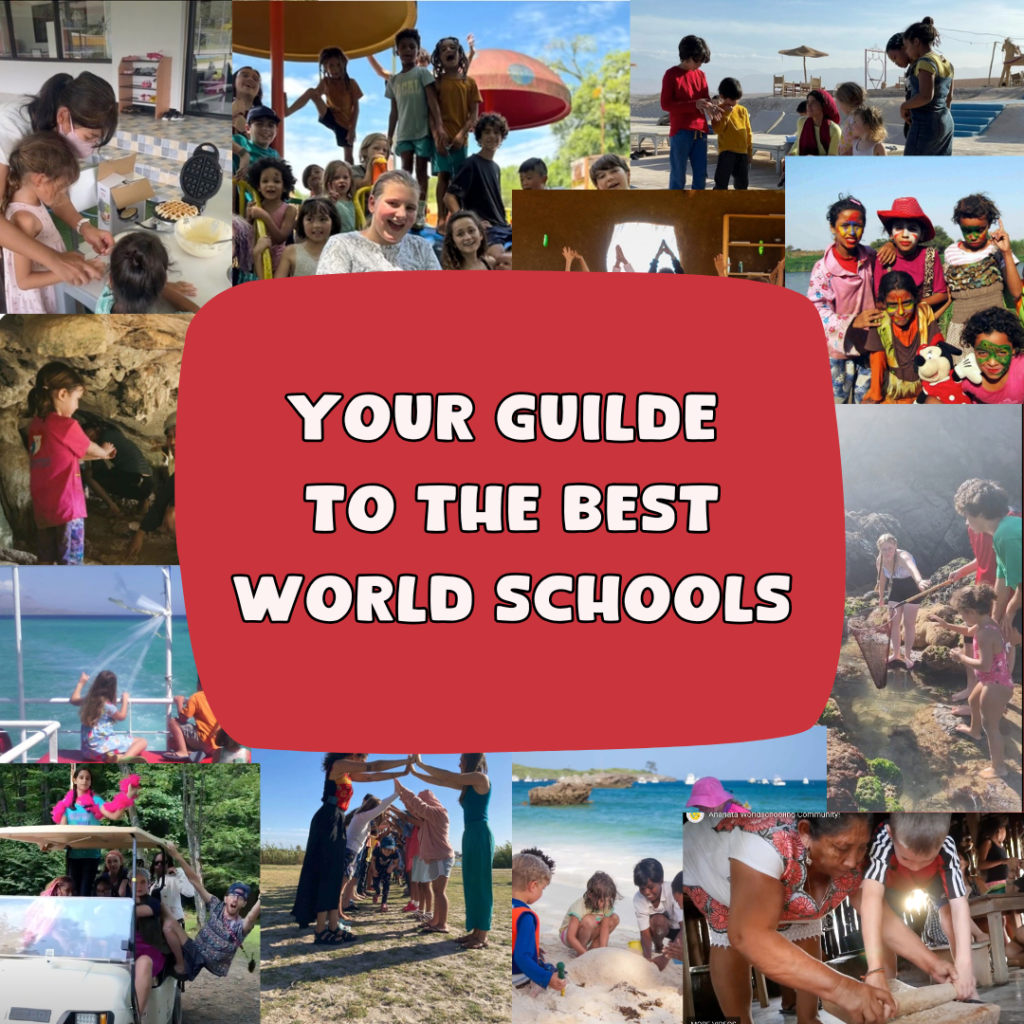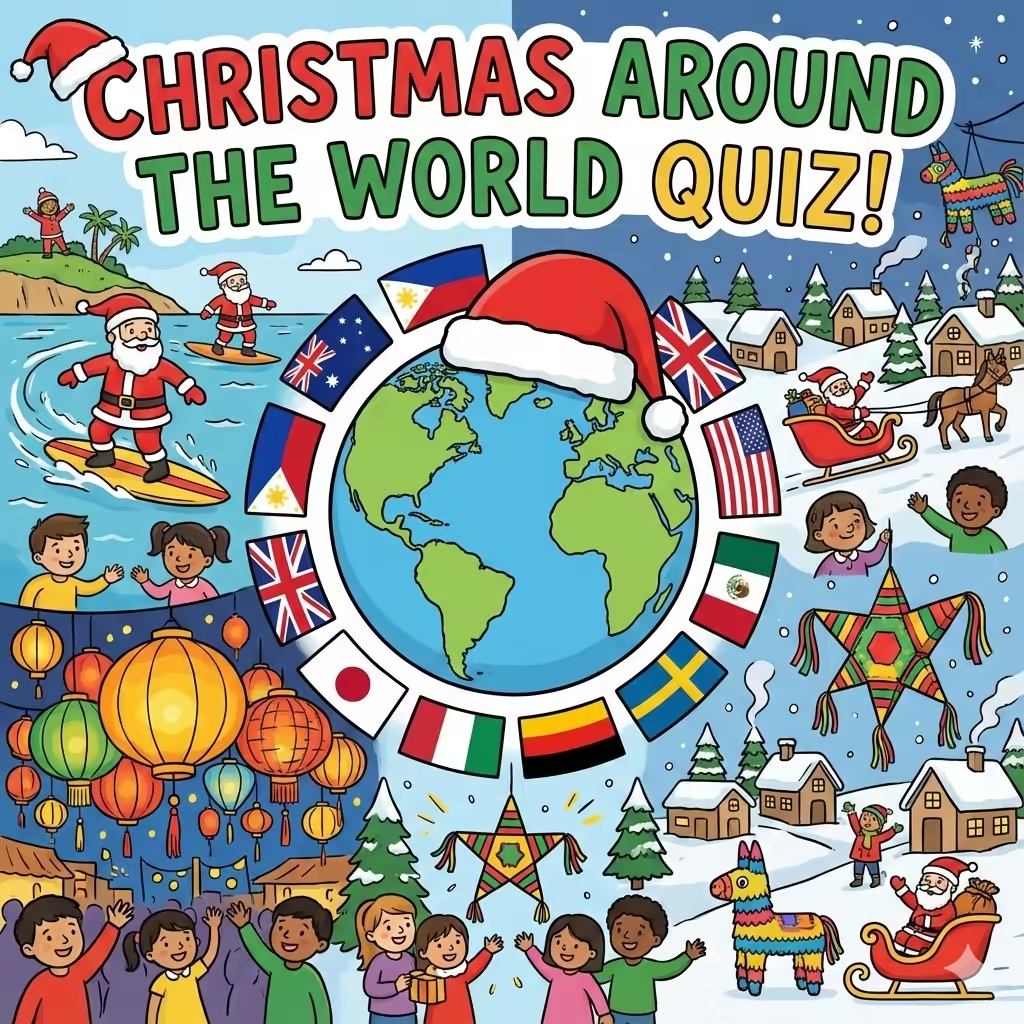Discover Global Learning Communities: 2025’s Top Worldschool Hubs for Traveling Families
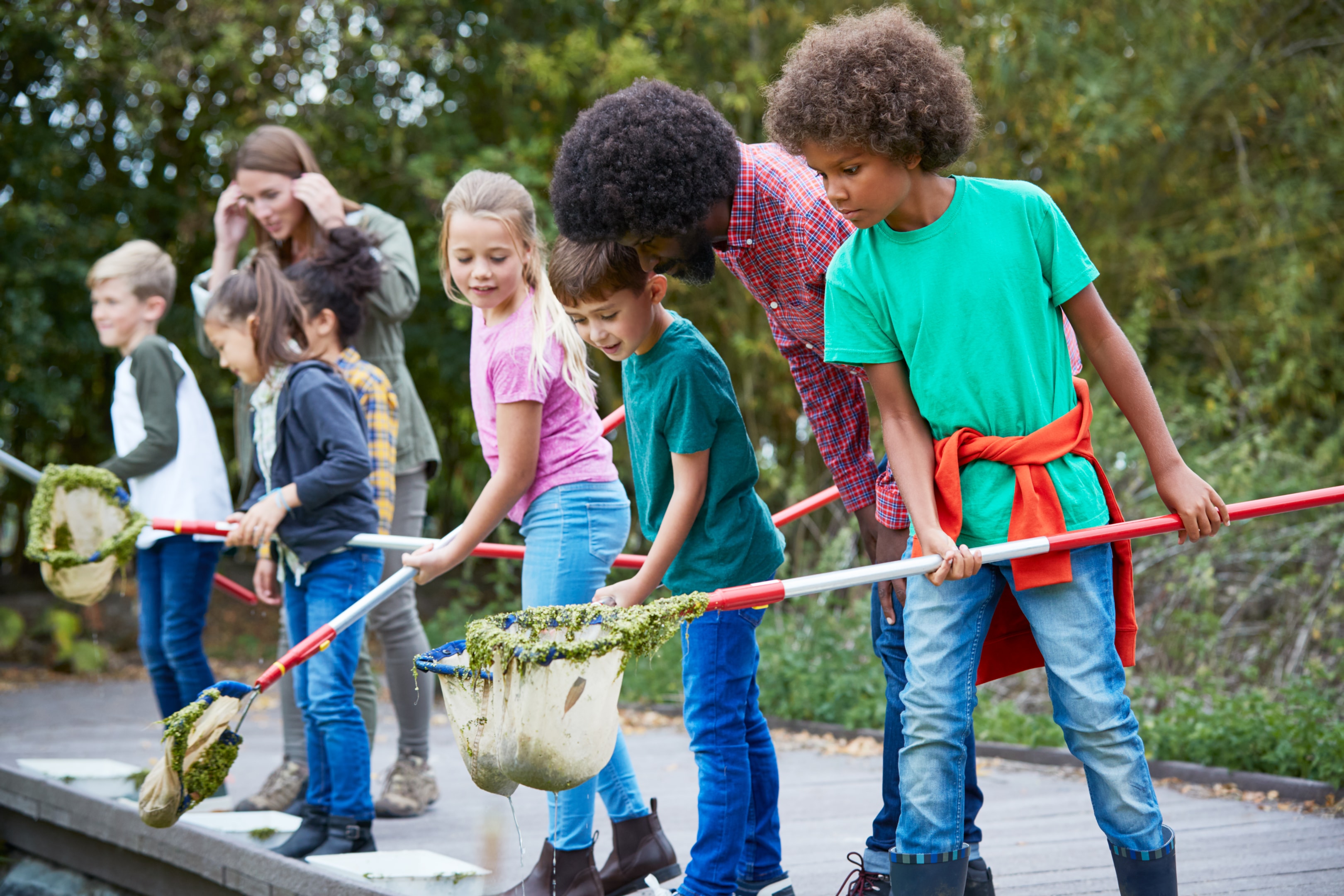
Over 2 million families worldwide have chosen worldschooling as their path of education and community hubs are springing up globally to support this growing tribe of location independent learners.
Beyond Bathroom Lessons: The Real Power of Worldschooling Communities
Ever found yourself hiding in the bathroom of your Airbnb whispering multiplication facts to your 2nd grader while your 3 year old flushes your room key down the toilet? If you’re nodding in recognition, you’re not alone in the sometimes chaotic world of worldschooling.
The vision that inspired you—using the entire world as your classroom—can sometimes feel overwhelming by the practical realities of teaching on the road. Those Pinterest perfect images of children learning geometry from ancient architecture quickly give way to half completed worksheets, time zone induced meltdowns and the occasional 3 hour Bluey marathon while you navigate foreign public transport.
But what thousands of worldschooling families have discovered is that the secret to successful global education isn’t becoming a superhero parent-teacher—it’s finding your community.
The Rise of Worldschooling Hubs
“It’s when the whole world is your school, instead of school being your whole world,” says Eli Gerzon who coined the term worldschooling nearly a decade ago. This philosophy has sparked a movement that’s growing fast, with worldschooling Facebook groups tripling in membership over the past 5 years.
These digital communities have evolved from virtual connections into physical worldschooling hubs where traveling families can meet up for learning, friendship and mutual support.
From Bali to Portugal, Mexico to Thailand these pop up communities offer what every worldschooling family secretly craves: structure without confinement, socialization without permanence and most importantly other adults who understand exactly what you’re going through.
Worldwide
Worldschool Pop-up Hub
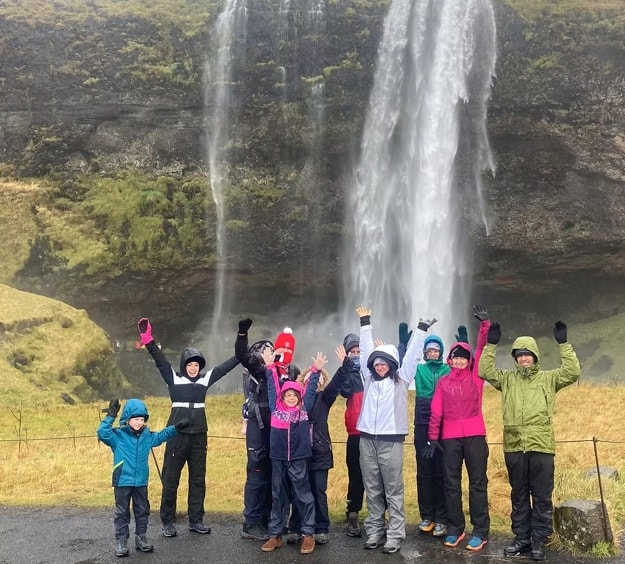
What They Offer
Worldschool Pop-Up Hub creates temporary gatherings where you can build community and explore our planet with like-minded families. Their events include group outings at parks, playgrounds, nature areas, museums, markets, and activities unique to the area such as UNESCO sites, holiday markets, or cherry blossom season.
Curriculum
The popups are family-centered events with no set curriculum. However, there is always the opportunity to learn a bit about the history and culture while visiting nearby museums, nature reserves, and local food vendors. Plus the schedule is flexible, your family only attends the activities that interest you!
Costs
Costs are US$180 per family per week. Discounts are available for early registrants and families in need. Individual families cover their own accommodation, meals, and transportation costs so you have flexibility in your budget.
What’s Special?
- Community Driven: The Worldschool Pop-Up Hub collaborates with traveling families: Every event is designed and hosted by a worldschooling family like yours!
- Global Destinations: The platform has run over 100 events covering 6 continents. Check the online calendar for current offerings: Upcoming Events.
- Accessible Community: The popups are designed to be budget-friendly and welcoming. It’s easy to dip into the community & string together multiple popups during your travels.
Website: Worldschool Pop-Up Hub
Instagram: Worldschool Pop-Up Hub
Traveling Village (Global)
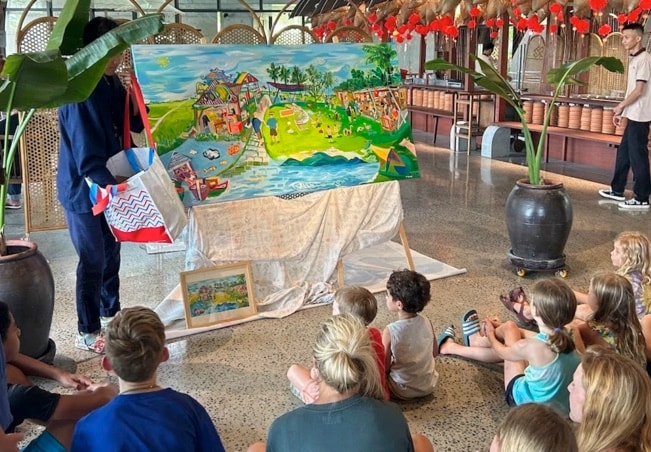
What They Offer
Traveling Village is an innovative worldschooling experiment where families travel together for extended periods, creating a unique community centered around self-directed learning, cultural immersion, and shared experiences. With a focus on breaking away from traditional family silos, Traveling Village provides a supportive environment for both children and adults to explore the world collaboratively. Each “village” consists of 15-20 families traveling together for months at a time, offering stability and social connection during global adventures.
Curriculum
The program emphasizes self-directed learning and free play for children, allowing them to explore different cultures and environments naturally. Adults and children alike engage in cultural exploration, community-building activities, and shared learning experiences. The flexible structure encourages families to learn through real-world interactions rather than formal lessons.
Cost
Specific costs vary per program but to give you a rough idea, these are the costs for their upcoming trip to Asia:
$1,300– Sign-up fee. This fee – and this fee alone – goes to TV. It pays the founding families and helps make TV long-term sustainable. Community fund contribution
$2,550– Community fund contribution. This amount goes into a communal fund, that is managed by a workgroup. The money goes to running the Nest, communal meals, events, and activities.
Personal costs– Each family covers their own personal costs. This keeps things flexible for each family to decide how they want to travel.
What’s Special?
What makes Traveling Village unique is its focus on creating a stable, community-oriented environment while traveling. Families benefit from shared logistics, mutual support, and the opportunity to form lasting connections with like-minded travelers. The program’s emphasis on free play and cultural immersion ensures that children learn organically while exploring new environments. Upcoming villages include Village 2 (Europe campervan trip in September 2025) and Village 3 (Vietnam, Taiwan, South Korea in January 2026).
Website: https://travelingvillage.com/village-3
Asia
Asia has become a hotbed for worldschooling families with diverse cultural experiences, affordable living and innovative educational hubs. From bustling cities to serene tropical retreats the continent offers a rich tapestry of opportunities for families to blend experiential learning with global exploration. Below is an in depth look at 9 unique worldschool hubs in Asia, what they offer, how much they cost and their educational philosophies.
1. Green School Bali (Indonesia)
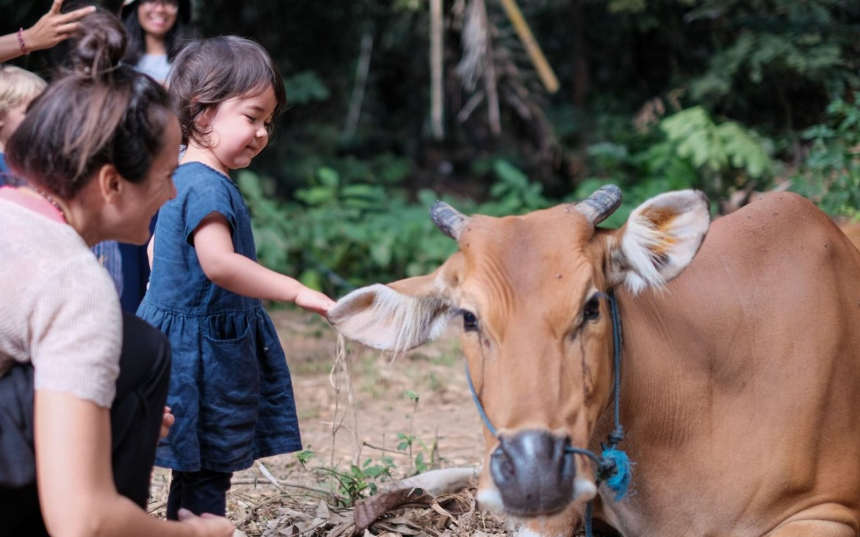
Green School Bali is one of the most well known worldschooling hubs globally, with short term enrollment options for traveling families. Located in the jungle of Ubud, this eco school puts sustainability and environmental education at the forefront of its curriculum.
What They Offer
Green School Bali combines traditional academics with hands on learning in permaculture, renewable energy and community service. The bamboo buildings are an immersive environment that aligns with the schools ethos of sustainability.
Curriculum
The curriculum blends International Baccalaureate (IB) principles with a Green Studies program focussing on environmental stewardship and global citizenship.
Costs
Short term enrollment fees are $1,000-$2,500 per month per child depending on the grade level. Meals and transportation are extra. Scholarships are available for families who demonstrate financial need and share the schools vision.
What’s Special?
Parents can join workshops and community events while children can experience Bali’s rich cultural heritage through art and music classes.
Website: Green School Bali
2. Forever Wild Pods (Vietnam and Malaysia)
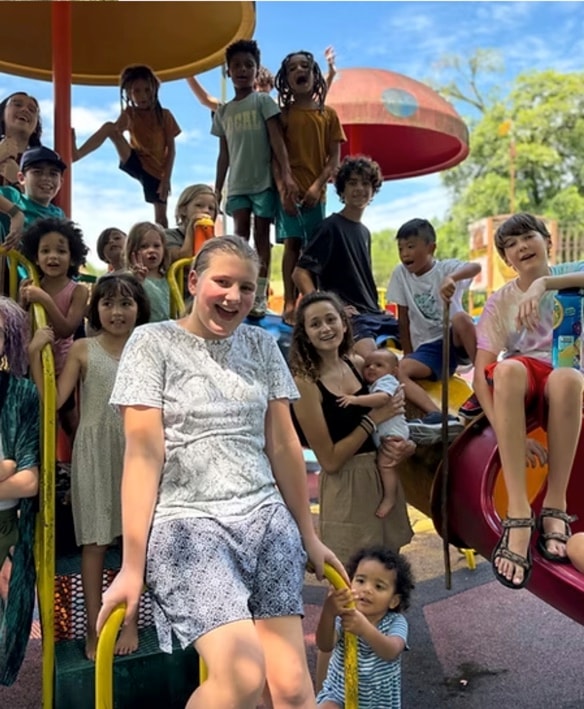
Forever Wild Pods are pop-up worldschooling hubs in Da Nang (Vietnam) and Penang (Malaysia) providing structured yet flexible educational experiences for families on the move.
What They Offer
Immersive group activities such as field trips to cultural attractions, nature based learning and collaborative projects to spark curiosity and creativity.
Curriculum
Our curriculum is tailored to each child’s needs while incorporating experiential learning themes like local history or biology through nature exploration.
Cost
Their community access is $400 per month per family.
Morning sessions (9am-1pm) are $650 per child per month.
Afternoon sessions (1pm-3pm) are $325 per child per month.
What’s special?
A community environment where children and parents can connect with like-minded people.
Website: https://www.foreverwildlt.com/
Instagram: https://www.instagram.com/foreverwildchildrensgarden/
3. Lanta Global Village International School (Thailand)
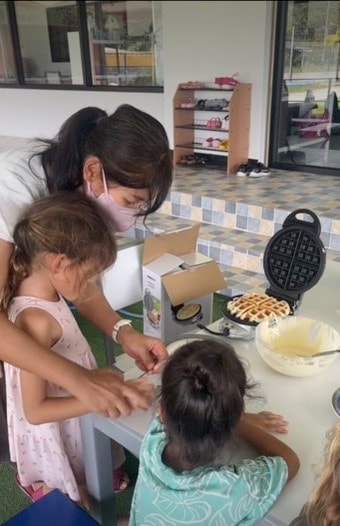
Located on Koh Lanta island in Krabi, Thailand Lanta Global Village International School welcomes short term students into the Canadian curriculum.
What We Offer
Structured academics and cultural immersion activities such as Thai cooking classes and traditional dance workshops.
Curriculum
Compassionate Citizenship principles integrated with core subjects like math and science and arts programs.
Fees
Tuition fees are THB 150,000 per year per child for full time students but flexible rates for short term students based on duration of stay.
What’s Special?
Island setting allows for outdoor learning experiences such as snorkeling trips and eco-tourism projects
Website: https://www.isa.ac.th/
4. NatureMind ED Gathering (Thailand)
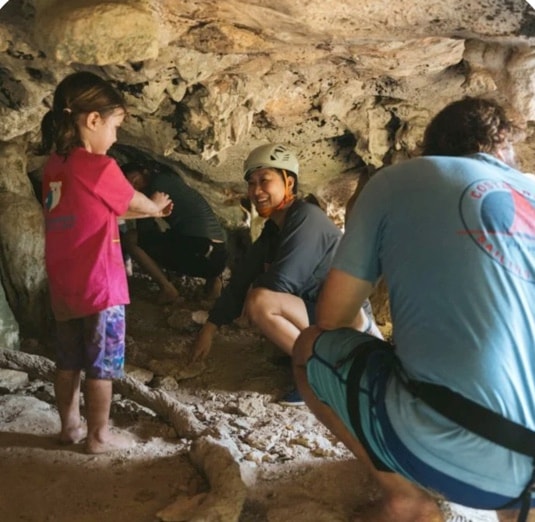
Located on Spirit Mountain in Krabi, NatureMind ED has short programs for families who want nature based education with mindfulness.
What They Offer
Rock climbing, freediving lessons, nature therapy sessions, ecology and sustainability workshops
Curriculum
Experiential and self directed, place based learning that develops social emotional learning and intellectual growth.
Prices
$800-$1,500 per family for week long programs depending on activities.
What’s Special?
Led by experts in ecology and mindfulness practices, NatureMind ED helps you gain resilience and creativity through challenges in real life situations.
Website: https://naturemind-ed.com/experiences/worldschooling/
5. OurLand Conservation Camp (Thailand)
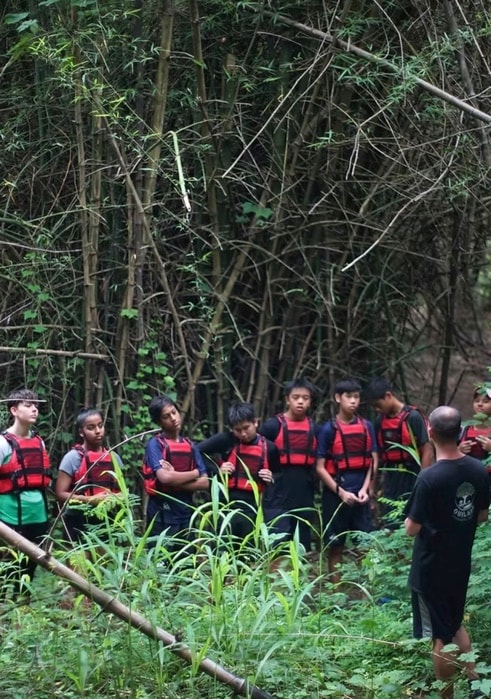
OurLand is an education centre located next to the Salakphra Wildlife Sanctuary in Kanchanaburi, Thailand. It runs camps for teenagers and families.
What They Offer
Mud art workshops, tree nursery, eco-detective programs for wildlife conservation, star gazing
Curriculum
Hands on environmental education
Costs
$600-$1,200 per family depending on duration and activities10
What’s Special?
Families learn about Thai wildlife conservation and get to contribute to sustainable practices.
Website: https://www.ourlandthailand.com/
6. HeadStart Summer Camp (Thailand)
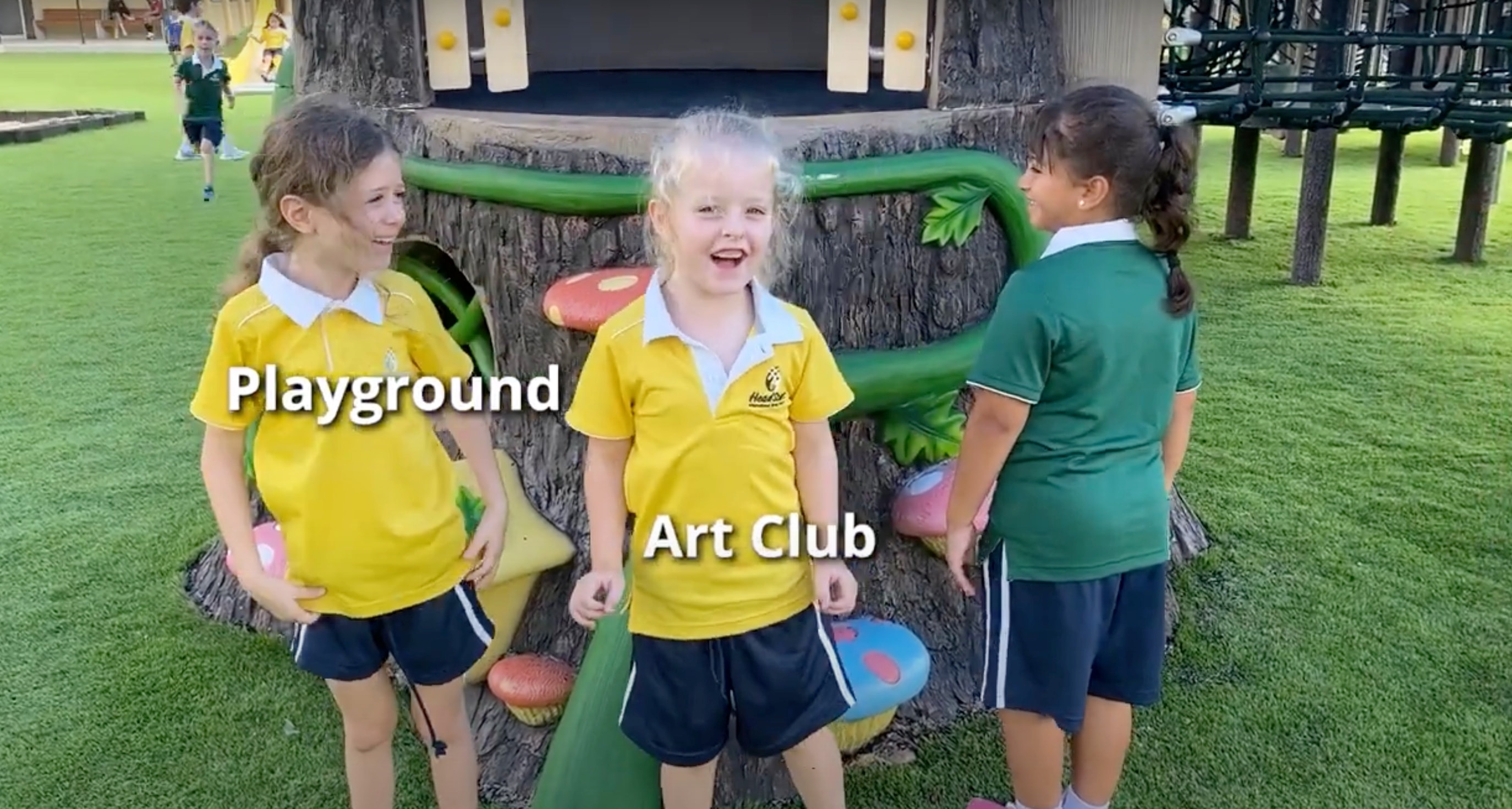
HeadStart International School’s Summer Camp is a fantastic short-term program for worldschooling families visiting Thailand who want to give their children a structured, age-appropriate cultural and educational experience.
What They Offer
The camp offers age-specific programs including Activity Camp (ages 4-5), Around the World Camp (ages 6-7), Discovery Camp (ages 8-10) and Adventure Camp (ages 11-14). Activities vary by age group but include arts and crafts, imaginative play, music, cooking classes, water play, cultural exploration, sports and special options like dance, drama, football, coding and martial arts.
Curriculum
Each age group follows a curriculum that combines experiential learning with global citizenship concepts. English language support options (Activity English Camp, Around the World English Camp etc) are available for children who need additional language development while doing the same activities as their peers.
Prices
Prices range from 18,000 Baht ( approx. $510) per week for the youngest age group to 20,000 Baht (approx. $565) per week for the older children. Prices include lunch, snacks, excursions, all in-house activities, lesson materials, art supplies, t-shirt and basic accident insurance.
What’s Special?
The camp runs in three specific weeks in July, with flexible booking options. Early bird discounts (10% off) are available for the first 50 registrations. Returning campers get 15% discount, outside applicants get 1,500 THB per week discount for second and third applications paid at the same time. The camp is located at HeadStart’s Cherngtalay Campus with modern facilities and a safe environment.
Website: https://headstartphuket.com/en/summer-camp
7. TFA Worldschooling Hub (Malaysia)
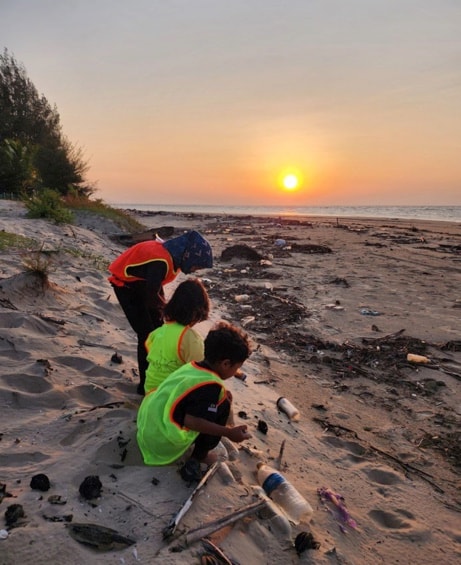
Situated in Pahang’s rural villages, TFA Worldschooling Hub offers 8 week short term programs combining travel education and cultural immersion.
What They Offer
Personalized curriculums tailored to individual needs and field trips that focus on local history and biodiversity.
Curriculum
TFA uses the D.E.S.I.R.E framework to encourage critical thinking and global connections among students through projects.
Fees
Fees are $1,200 per month per child not including accommodation.
What’s Special?
They incorporate brain architecture into their curriculum and encourage self directed research projects.
Check out their website to see latest news
Website: https://www.worldschoolinghub.my/
8. Summer Camp in Seoul (South Korea)
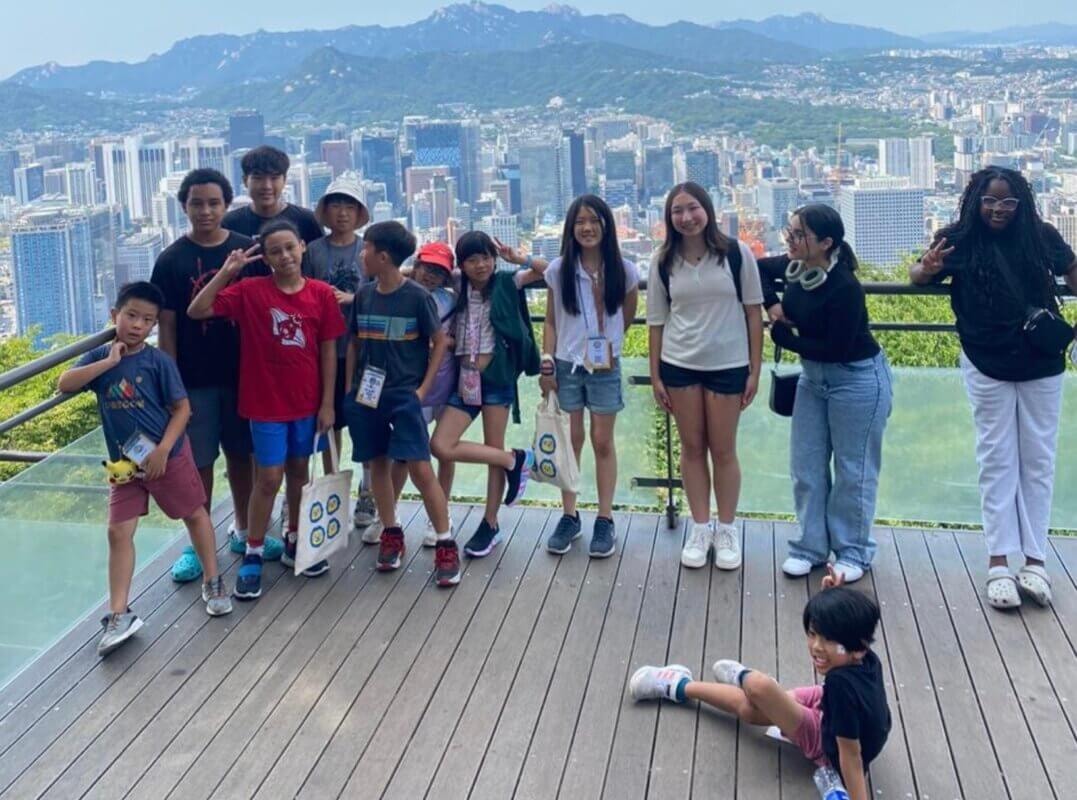
What They Provide
LTL’s Summer Camp in Seoul offers an intensive Korean language and cultural immersion program for children aged 7-17. The program combines structured language learning with cultural exploration across one of Asia’s most vibrant cities.
Curriculum
Children receive 4 hours of Korean language instruction each morning (20 hours weekly) followed by afternoon cultural activities and excursions. Every Saturday features a full-day trip from 9am to 6pm.
Costs
While exact costs aren’t specified in the search results, the program includes Korean language tuition, meals, and cultural activities. Families can choose between homestay or residence accommodation options.
Unique Features
- Flexible duration options (1-10 weeks during summer months)
- Choice between homestay with a Korean family for maximum cultural immersion or residence camp with other international students
- 24/7 emergency support and guide services
- Combines language learning with authentic cultural experiences
Website: https://ltl-korea.com/summer-camp-in-seoul/
Free online kids book club for the road!
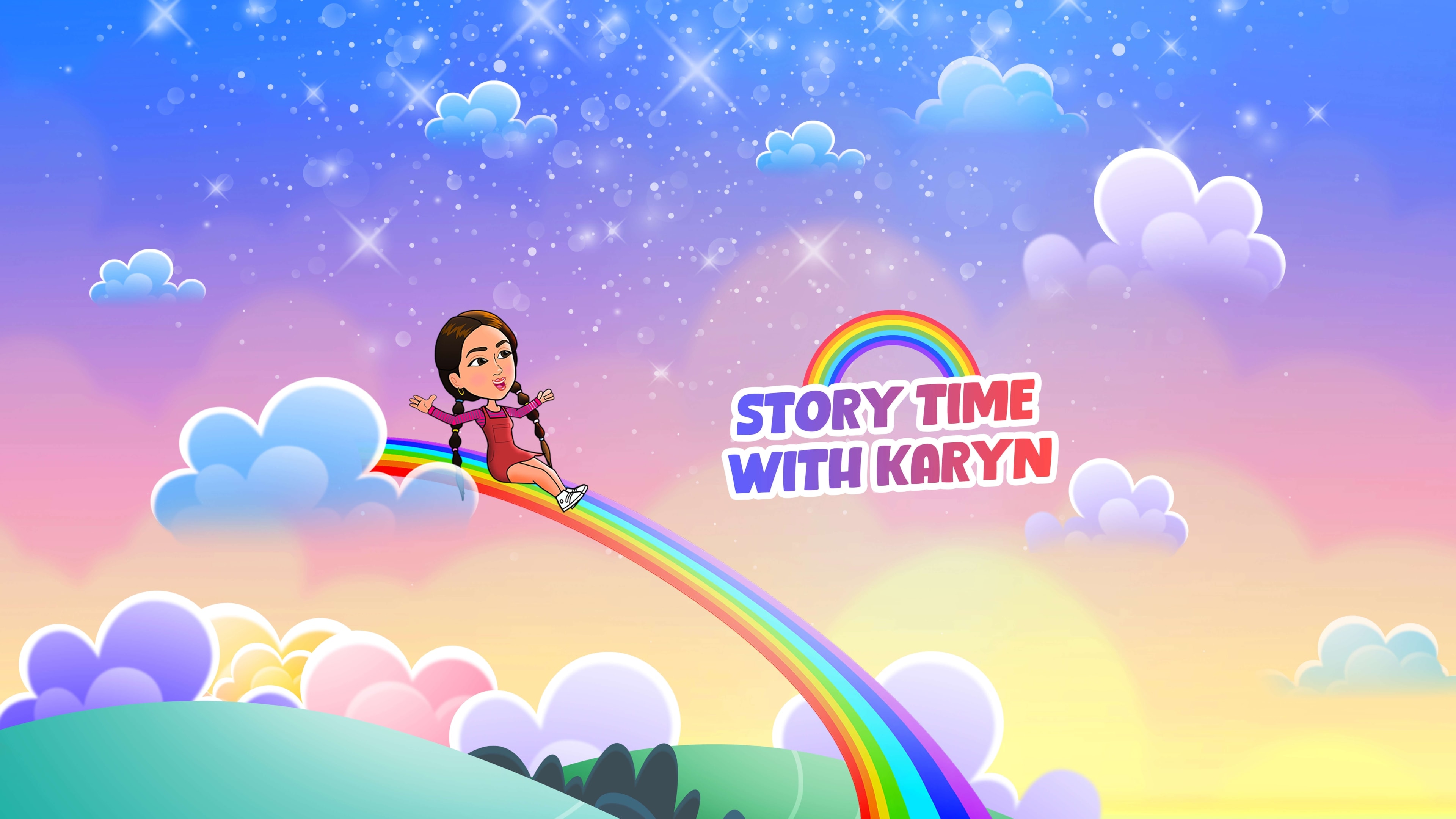
Looking for engaging educational content to compliment your worldschooling journey? Join our free online book club Designed to accompany our YouTube channel, StorytimeWithKaryn, we bring children’s books to life through low-stimulation animation and discuss morals and themes with the characters themselves. This unique approach helps young learners connect deeply with stories and their messages.
Visit changetheworldwithkaryn.com for free educational resources, including printable worksheets that complement our book discussions. Your children can also become part of our global community by submitting their drawings, which we’ll proudly display in the slideshow on our homepage.
Whether you’re exploring ancient ruins or trekking through rainforests, our book club and resources provide consistent, quality learning experiences for your worldschooling family. Join us today and make storytime an unforgettable part of your educational adventure!
South America
South America is the ultimate destination for worldschooling families, where you can find rich indigenous history, stunning natural wonders and vibrant cultural traditions all wrapped up in an educational experience like no other. From the Incan ruins of Peru to the rainforests of Ecuador and the artistic heritage of Colombia, this continent offers immersive learning opportunities that turn traditional education on its head. Worldschooling hubs have been sprouting up across South America in recent years, providing structure for traveling families who want community and authentic cultural immersion. With Spanish and Portuguese language acquisition opportunities, affordable long term stays and year round tropical weather in many areas, South America has lots of advantages for families who are location independent. Below we explore 6 worldschooling communities across the continent where your children can learn by doing and develop global perspective and cultural awareness.
1. Deliberate Detour (Cusco, Peru)
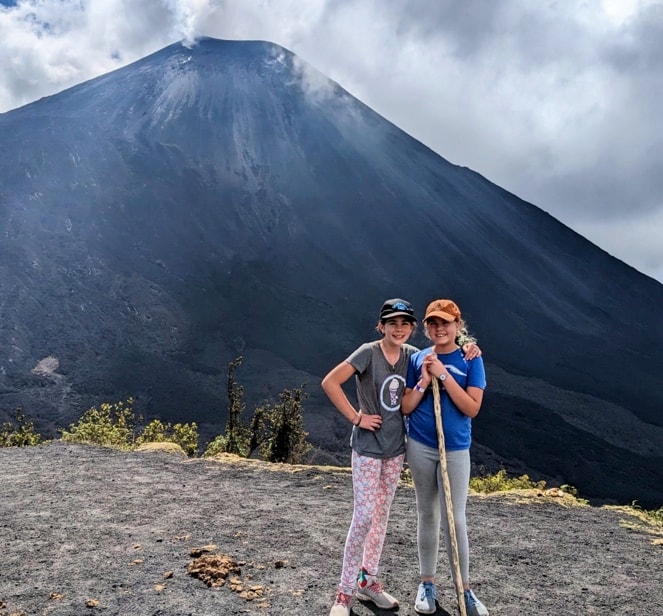
What They Offer
We have found that Deliberate Detour’s Cusco base offers one of the most cultural programs for worldschooling families. Children ages 7-16 participate in 4 hub-based days per week (approximately 5 hours each) with Peruvian cultural activities, field trips and community experiences. They provide delicious vegetarian lunches, healthy snacks, transportation during program hours and all materials.
Curriculum
The approach at this hub is super experiential – children don’t just read about Incan civilization they explore archaeological sites, participate in traditional craft workshops and interact with local experts. Families always report that their children develop a deep connection to Peruvian culture through these direct and meaningful experiences.
Cost
Families can expect to pay $795 per person for 2 week hubs or $1,205 per person for 3 week hubs. That’s great value for the level of cultural immersion. Optional extras that many families find worth it are Friday Field Trips ($85-$110 per person), Parent-Only Activities ($55-$105), Spanish lessons ($28 per hour) and the highly recommended Machu Picchu Weekend ($395 per person). Remember accommodation, airfare and transport to Cusco are not included in these prices.
What’s special?
What sets this hub apart is its proximity to legendary Incan sites, bilingual staff with local connections and thoughtfully designed parent activities. Their 2025 schedule is: March 30-April 11, April 20-May 2, June 22-July 4, July 6-25, August 3-15. Book early as these programs often fill up months in advance!
Website: https://deliberatedetour.com/about-all-hubs/
2. Minga House Worldschooling (Colombia)
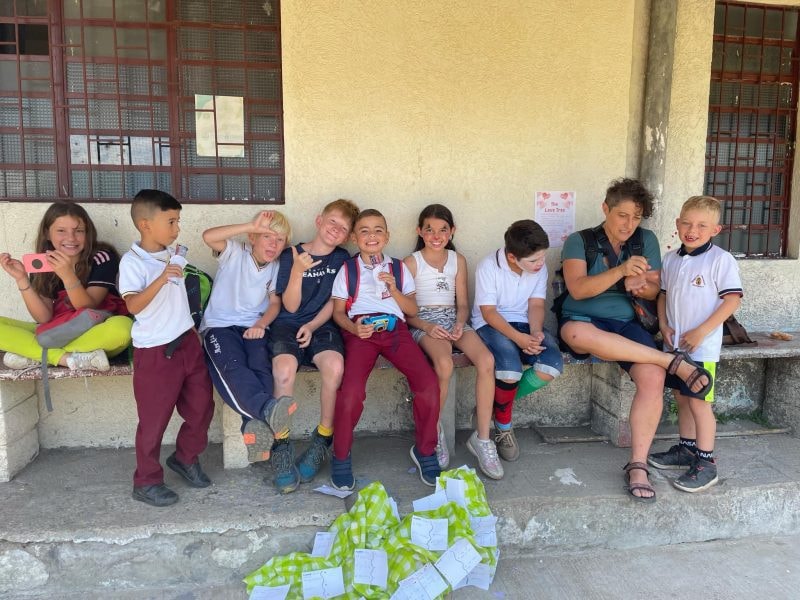
What They Offer
We love Minga House Foundation’s approach, offering 4-12 week immersion experiences in Colombia’s coffee region. This is unique because children (ages 0-16) actually attend local Colombian schools during regular terms and engage in community activities in the afternoons – authentic cultural integration you won’t find in other programs.
Curriculum
The educational experience is organized into themed sessions: “Global Citizenship,” “Celebration & Reflection,” “Natural Wonders,” and “Arts & Innovation.” What we love about this curriculum is how it combines formal Colombian classroom time with community-based experiential learning in the afternoons.
Costs
Monthly rates (in USD) per family (including parents):
- Family of 2: $1,833
- Family of 3: $1,667
- Family of 4: $2,020
- Family of 5: $2,222
- Family of 6: $2,346
- Family of 7: $2,409
This pricing includes accommodation in “a historic 1980s mansion on a coffee farm within city limits” with amenities like comfortable beds, warm water showers, WiFi, swimming pool, and scenic views1.
The program runs in full 12-week sessions (which are divided into three 4-week modules), with families able to join for shorter periods. The annual schedule includes:
- Aug 4 – Oct 26
- Nov 3 – Jan 25
- Feb 2 – Apr 26
- May 4 – Jul 26
Transportation from nearby airports (Pereira or Manizales) is included in the all-inclusive package
What’s special?
What we like about this program is the authentic Colombian education, the location in the coffee region and the small size (only 9 participants per session). Their 2025 sessions are theme focused: Aug 4-Oct 26 (Global Citizenship), Nov 3-Jan 25 (Celebration & Reflection), Feb 2-Apr 26 (Natural Wonders), May 4-Jul 26 (Arts & Innovation).
Website: https://worldschooly.com/hub/minga-house-worldschooling/
3. Punta la Barca (Ecuador)
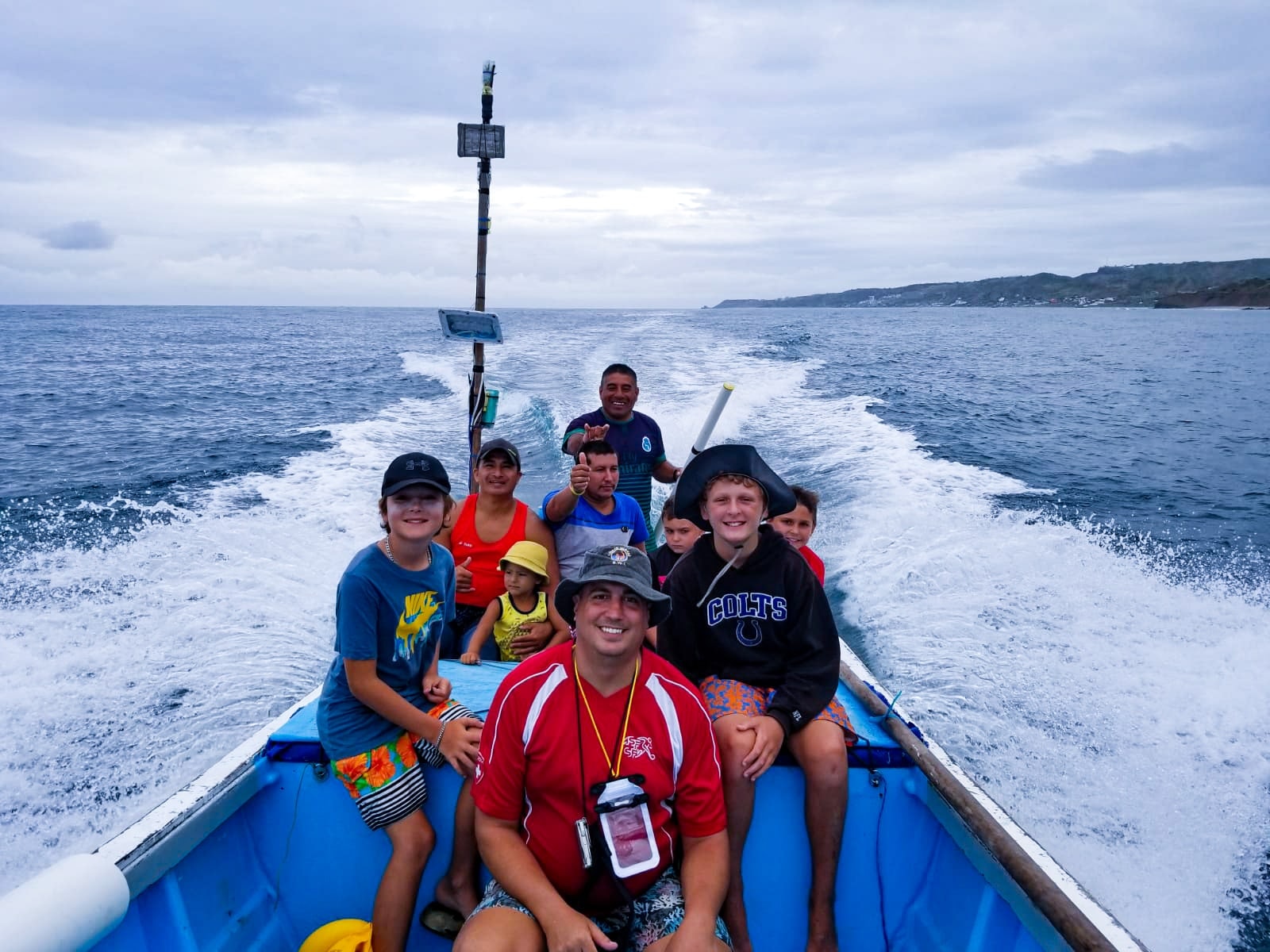
What They Offer
For families who want a worldschooling community and a place to work remotely we found Punta la Barca to be the perfect solution. Located on Ecuador’s Pacific coast in Manabi this coliving and coworking community has good WiFi for working parents, comfortable accommodation options and a lively community with shared meals and activities.
Curriculum
Children thrive in their Montessori inspired program that makes the most of the coastal environment for nature based learning. Instead of formal classroom instruction kids do guided exploration, community projects and plenty of free play in a safe and supportive environment.
Costs
Monthly rates start at $1,800 for a family of four including accommodation in their eco friendly facilities. For families staying longer term rates drop to around $1,500 for a 3 month commitment. We think many families find this a great value compared to finding separate accommodation, workspace and activities.
What’s Special?
The beachfront location with access to untouched natural environments is what sets this hub apart from many others. Families love the community focus with shared meals and evening gatherings, surfing and other outdoor activities and cultural exchange with the nearby Ecuadorian villages.
Website: https://puntalabarca.com/
4. Project World School Family Summit (Latin America)
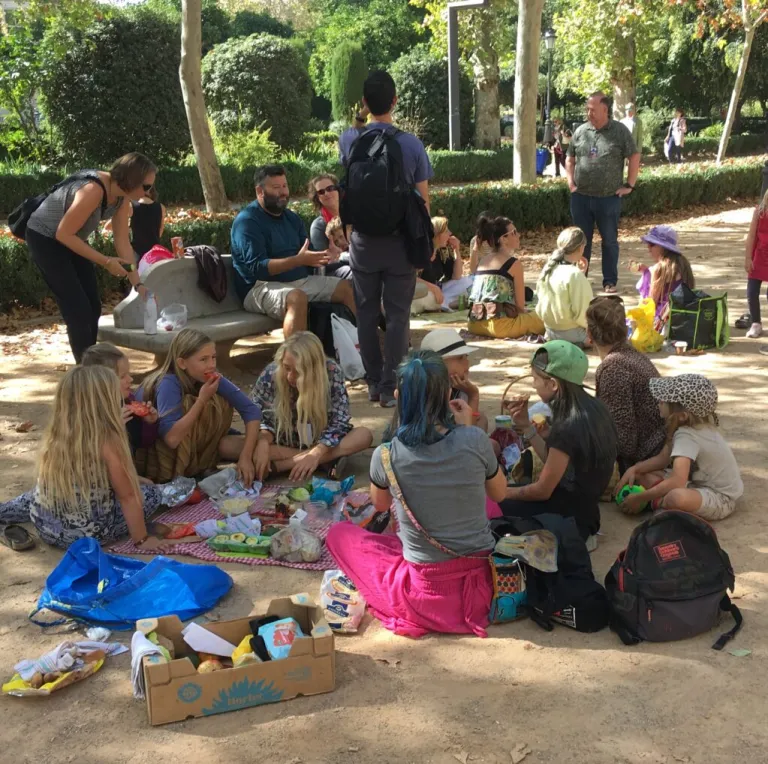
What They Offer
We highly recommend Project World School’s twice-annual Family Summits for worldschooling families looking for community and inspiration. These temporary meetups bring together dozens of worldschooling families to share experiences, challenges and solutions in a structured but relaxed format.
Curriculum
What makes these summits special is the focus on sharing real worldschooling approaches and strategies. Presentations, workshops, discussions and activities are led by experienced worldschooling families, creating a knowledge-sharing environment that benefits both newbies and veterans.
Cost
Tickets for these 4-5 day events are around $395-$595 per adult and $195-$295 per child, which is great value for the networking and learning. These prices usually include all scheduled activities, several meals and sometimes accommodations depending on the summit package you choose.
What’s Special?
The summit allows you to connect with diverse worldschooling families from all over the world in one place. What families most value are the smaller groups before and after the main summit, the variety of perspectives shared and the lifelong friendships that are formed long after the event is over.
Website: https://worldschoolfamilysummit.com/category/summit-blog-posts/
5. Fala Brasil Cultural Immersion Program (Rio de Janeiro, Brazil)
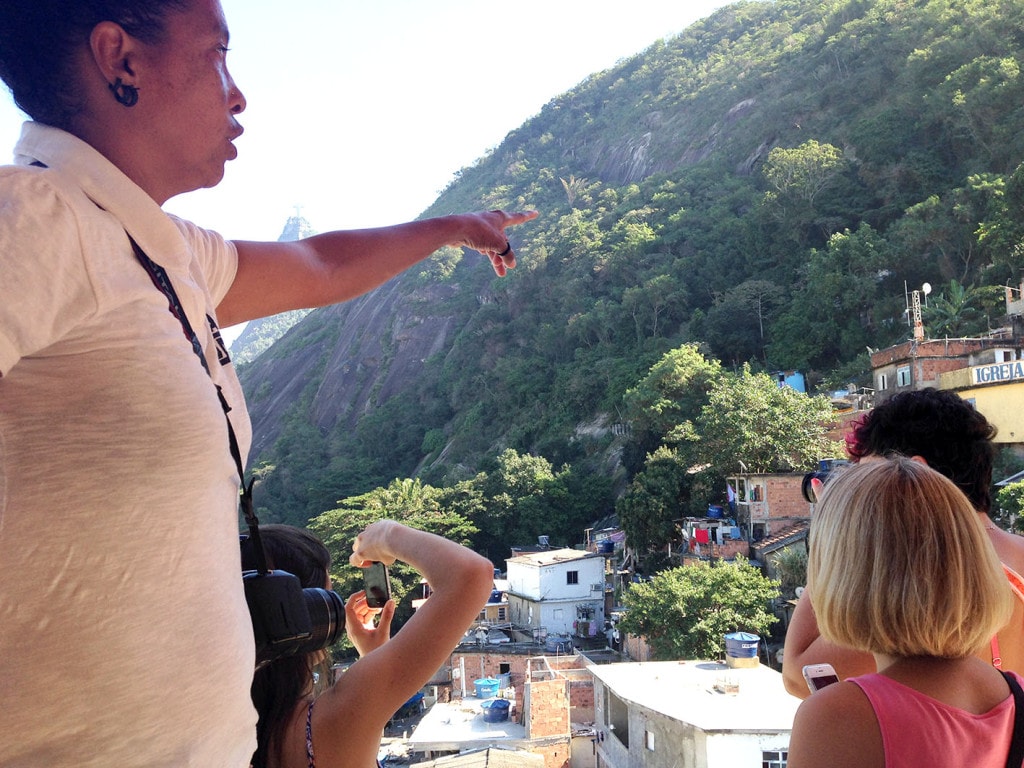
What They Offer
Fala Brasil Portuguese Language School offers a cultural program to complement language learning. Their Cultural Immersion Experience gives worldschooling families the chance to live Brazilian daily life, see local customs and connect with the culture of Rio de Janeiro through guided activities with local experts.
Curriculum
Instead of traditional classroom learning, this program is about cultural and linguistic immersion through experiences like visits to local markets, Brazilian music and dance, culinary traditions and special places known only to locals. These experiences create linguistic and educational exchanges through natural interaction with native speakers and cultural experts.
Cost
The Cultural Immersion Experience is free for students enrolled in their Portuguese language courses. Language courses start at around $200 per week, with discounts for family enrollments and long term commitments.
What’s Special?
What makes this program special is that it focuses on local experiences not tourist attractions. Each cultural immersion activity is led by different experts who share their personal stories and insider knowledge. The program is flexible so perfect for worldschooling families who want to combine structured language learning with cultural exploration.
Website: https://www.falabrasilschool.com/cultural-immersion-program/
6. Ecovillage Sembrando Vida (Ecuador)
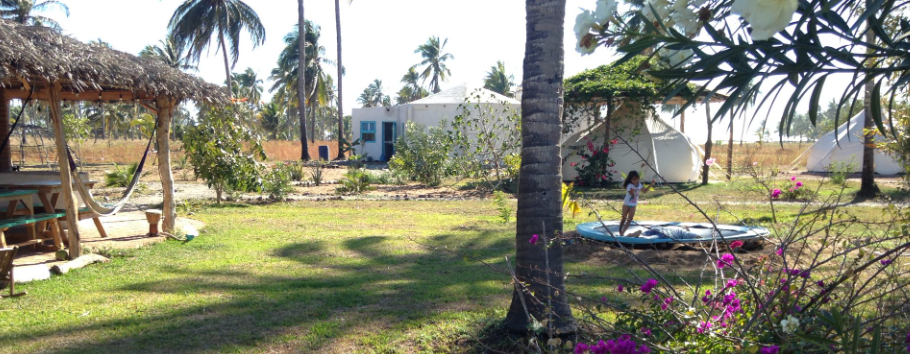
What They Offer
Ecovillage Sembrando Vida is an international eco-village in Ecuador operating as a healing sanctuary and learning center for themselves and others. Their foundation is based on four pillars: community, spirituality, environment, and education. They welcome worldschooling families seeking immersive cultural and ecological experiences centered around holistic living practices.
Curriculum
While the learning approach isn’t formally structured, they offer many opportunities for practical, hands-on education. Specific offerings include animal care, holistic health practices, organic gardening, and environmental sustainability. The village is also building a green holistic school for children. With a tranquil, natural environment nestled between palm groves, a mango orchard, and a mangrove, children can explore Ecuador’s natural world.
Cost
They offer stays from short visits to monthly commitments, with work trade opportunities for those with specific skillsets or interests. Prices and specific details are best inquired about through their email.
What’s Special?
What makes this community exceptional is their emphasis on spirituality and healing, creating a peaceful and positive energy for all participants. Their values are deeply integrated into daily life. This community provides a tranquil, natural environment located 400 meters from a pristine beach on the Pacific Ocean. It offers opportunities for worldschooling families to combine educational travel with personal well-being and community contribution.
Website: https://ecovillagesembrandovida.wordpress.com/

Looking for a way to keep your worldschooling kids entertained during downtime? Check out our notebooks on ChangeTheWorld’s Amazon Author Page. Each page has fascinating facts and hilarious jokes at the top to spark curiosity and laughter. But that’s not all – the real magic happens in the corner where a flipbook animation brings learning to life with every flip of the page.
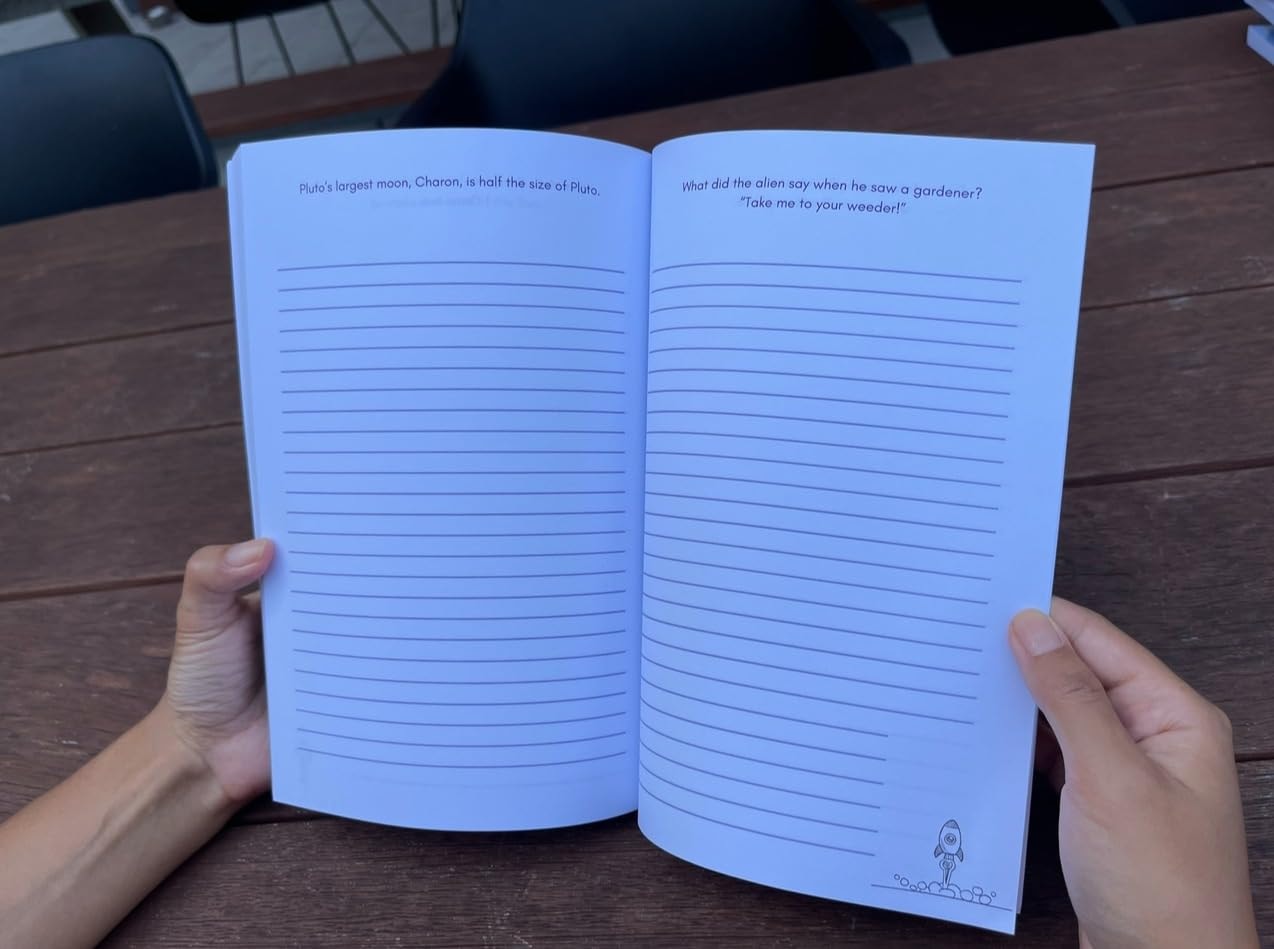
We have a range of themes including space exploration, underwater wonders, Christmas and Halloween. These aren’t just notebooks for note taking, they’re interactive learning tools that combine education and entertainment.
Whether you’re on a long flight, waiting for a train or settling in for some quiet study time these notebooks will keep young minds active and engaged. They’re perfect for worldschooling families who want fun and learning on their global adventures.
European Worldschooling Hubs: History comes Alive in the Classroom
Europe is the ultimate playground for worldschooling families, with millennia of history, multiple languages and cultures in a small geographical area. From Roman ruins to medieval castles, science museums to sustainability projects, the continent offers unparalleled opportunities for experiential learning across the curriculum. With excellent public transportation connecting 44 countries, worldschooling families can easily visit multiple educational environments and stay connected with their community through strategically located hubs. Europe’s strong educational heritage has led to innovative worldschooling approaches that combine traditional academic excellence with modern pedagogies, honouring local culture and global citizenship. Europe’s seasonal variation – from Mediterranean summers to Alpine winters – allows families to plan year round educational journeys following the weather and experiencing different ecosystems and cultural celebrations. Below we feature 13 worldschooling communities across Europe that welcome travelling families who want to turn history into a living classroom.
1. Eggeby Gårds Naturskola (Sweden)
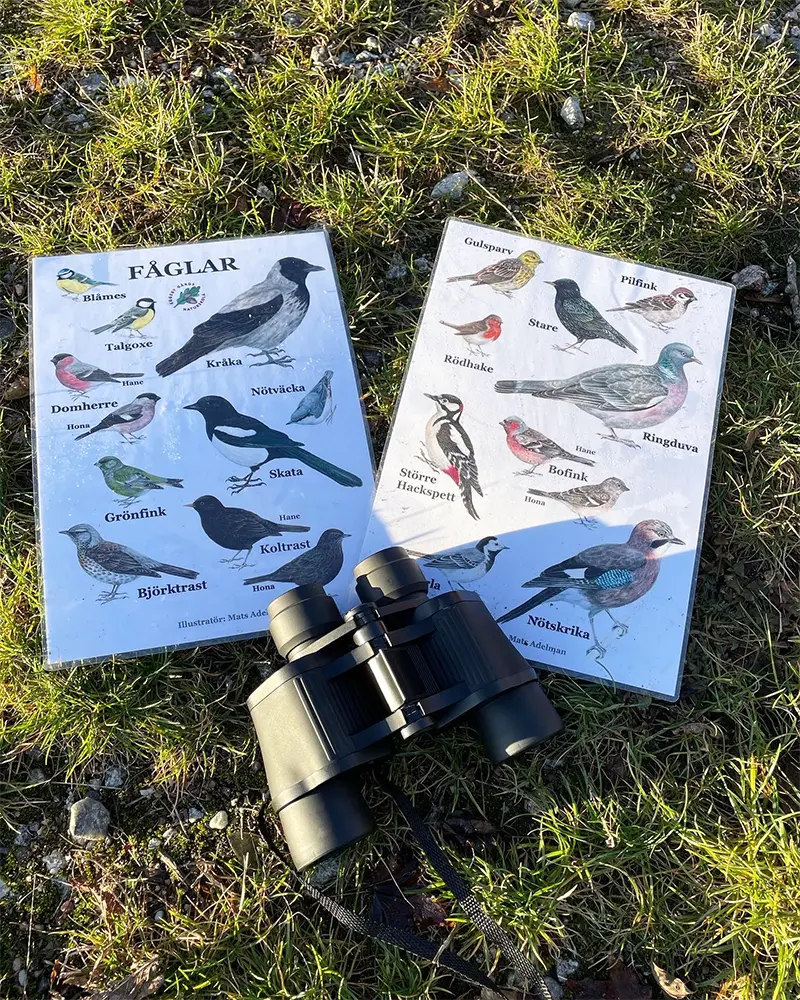
What They Offer
Eggeby Gårds Naturskola, Stockholms Stad’s main nature school, welcomes visiting families for outdoor education. Located in the beautiful nature reserve Järvafältet between Tensta and Kista, this established program offers day visits and short programs for worldschooling families. Their experienced teachers facilitate nature-based learning in real Swedish forest environments throughout the year.
Curriculum
The school’s curriculum has 25 different themes aligned with the Swedish curriculum but open to visiting families. Children do ecological studies, seasonal activities like tracking animals in snow in winter or wild berry foraging in summer and traditional Swedish outdoor skills. The program focuses on learning through direct experience in nature regardless of weather, as the Swedish saying goes “there is no bad weather, only bad clothing”.
Cost
Mainly serving Stockholms municipal schools, Eggeby offers family nature days a few times a year for 400 SEK (35€) per family. For worldschooling families who want to participate more frequently, arrangements can be made for weekly participation for 300-350 SEK (25-30€) per child and family discount.
What’s special?
What’s unique is the real Swedish nature education tradition in a setting just minutes from central Stockholm. The school’s approach balances structured ecological education with free exploration, so children can develop confidence in nature while building scientific understanding. The farm is from the 1700s, so there’s cultural context to the ecological learning.
Website: https://www.eggeby.se/aktiviteter/eggeby-gards-naturskola/
2. Ubuntu Worldschool (Cantabria, Spain)
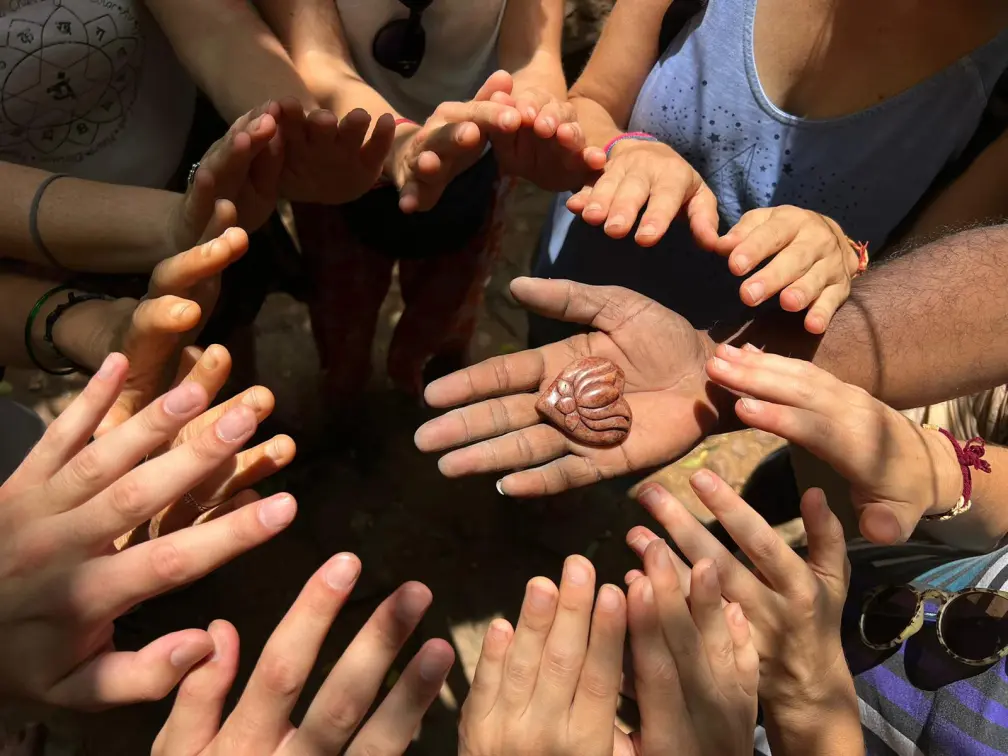
What They Offer
Ubuntu Worldschool offers a community based worldschooling experience in the beautiful Pasiego Valleys of northern Spain. They provide scheduled childcare 5 days a week, co-working space with fast internet for parents and a rich variety of cultural and outdoor activities. The hub is 25 minutes from the beach and 35 minutes from Santander in a village co-living environment.
Curriculum
Their program is holistic worldschooling where learning happens through real life experiences rather than being confined to a classroom. Their activities include visits to local entrepreneurs for hands on experiences at an artisanal cheese factory, ceramic atelier, and organic farm. Children also participate in community activities like yoga, meditation circles and Karma Kitchen (volunteering experiences teaching values in action).
Cost
They have a unique sliding scale contribution system for socio-economic diversity:
- Higher income families: €950-1,150 per week for the family
- Average income families: €700-850 per week for the family
- Lower income families: €400-600 per week for the family
All contributions include accommodation, childcare, activities and co-working space.
What’s Special?
What makes this hub special is their strong focus on social transformation and community building. Their approach combines Waldorf education principles with experiential learning and values based activities. The natural setting provides amazing opportunities for adventure like river swimming, mountain hiking, waterfall exploring and cycling along the 30km riverside path. They also organize cultural activities like visiting ancient caves with some of the oldest paintings in Europe.
Website: https://espacioubuntu.org/2024/12/20/world-schooling-hubs-in-cantabria-spain/
3. JFK Swiss Outdoor Camp (Switzerland)
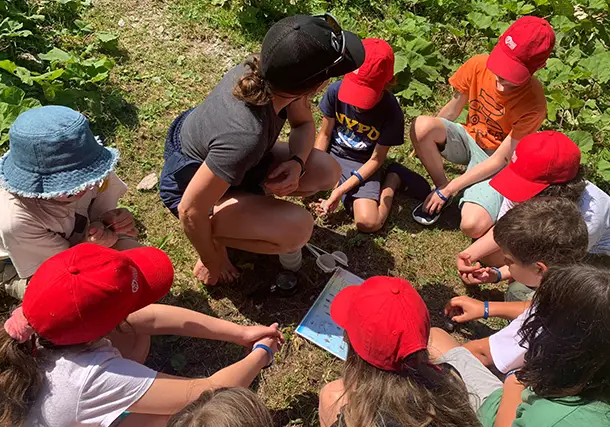
What They Offer
JFK Swiss Outdoor Camp provides immersive Alpine adventures for children aged 6-14 in the stunning Saanenland region of Switzerland. Based near the famous ski resort of Gstaad, the camp combines outdoor exploration with hands-on learning experiences in a multinational environment. Children can attend as day campers or boarding campers, with professional mountain guides maintaining a 6:1 ratio for safety and personalized attention throughout all activities.
Curriculum
The program follows weekly themes that fully utilize Switzerland’s magnificent Alpine environment: Water Week features adventure activities in lakes and streams; Mountain Week includes hiking and overnight camping; and Rock Week focuses on natural rock climbing and related skills. Children learn through direct experience, developing confidence through challenges like raft building, ziplining, and mountain exploration. The curriculum emphasizes that “outdoor learning is all about Nature—you learn with demonstration and evidence. Touching and seeing is all it is about.”
Cost
For summer 2025 (July 6 to August 17), families can choose from several options:
- Two-week Boarding program: CHF 6,000 per child
- Two-week Day program: CHF 4,800 per child
- Three-week Boarding program: CHF 8,525 per child
- Three-week Day program: CHF 6,200 per child
All fees include activities, instruction, materials, meals, and for boarding campers, accommodation in traditional Swiss chalets and laundry service.
What’s Special?
What makes this program unique is its authentic Swiss Alpine setting combined with a truly international community representing over 22 different nations. The camp’s core values “echo the key concepts of outdoor learning: challenge, enjoyment, relevance, depth, development of the whole person and an adventurous approach to learning.” Their philosophy that “the value of experience is not in seeing much but in seeing wisely” permeates all activities, while children develop self-confidence through accomplishing challenging outdoor tasks in one of the world’s most beautiful mountain environments.
Website: https://www.swissoutdoorcamp.ch/camp-life.html
4. El Aula Azul – Spanish in the City for Children (San Sebastian)
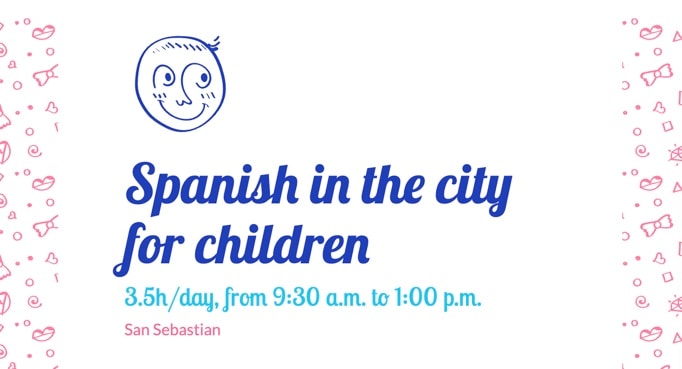
What They Offer
El Aula Azul offers a Spanish immersion program specifically designed for children aged 6-11, running 3.5 hours daily from 9:30 am to 1:00 pm. The program combines 1.5 hours of Spanish classes with 2 hours of recreational and cultural activities throughout San Sebastian. Parents can choose to add lunch from 1:00-3:00 pm for additional language immersion time.
Curriculum
Their methodology employs a communicative approach with a strong focus on oral language development. The program includes museum trips, dance classes, sports, beach games, and collaborative learning activities. All teaching materials are included, and instruction is provided by native teachers qualified in teaching Spanish to children.
Cost
While specific prices aren’t listed in the search results, they offer a complete “Families 360°” program with twice-weekly activities for the whole family. These include family cooking workshops, friendly soccer matches with local children, boat tours with picnics on Santa Clara Island, visits to traditional cheese farms, and city bike tours. Discounts are applied when multiple family members enroll.
What’s Special?
What makes this program outstanding is its integration of family activities alongside children’s language learning. Parents can take intensive Spanish courses simultaneously (with family discounts applied). The program runs during summer months (June 2-August 15, 2025) in the beautiful coastal city of San Sebastian, allowing families to combine language learning with a beach vacation experience.
Website: https://www.elaulaazul.com/en/spanish-city-kids/
5. Liberaschola Worldschooling (Tenerife)
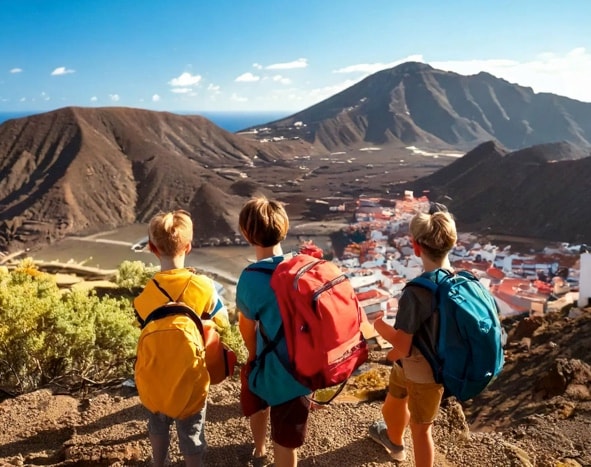
What They Offer
Liberaschola offers a worldschooling program in Tenerife, Canary Islands from July 1-10, 2025 for both teens and families with children. They provide intensive English and Spanish lessons combined with activities and group explorations of this amazing island.
Curriculum
For families, mornings are structured activities for younger children so parents can relax. Afternoons are group exploration activities and special evenings are beach walks, games and community building. The program uses the EDUlearn method where languages come alive through full immersion in both English and Spanish.
Cost
No costs mentioned in search results. It’s a 10 day full experience combining language learning with exploring Tenerife’s natural wonders from Santa Cruz to the UNESCO World Heritage Teide volcano.
What’s Special?
What’s unique about this program is that it’s for both teens and family experiences in the amazing Tenerife. Program is designed for homeschooling families or families exploring alternative education. Immersion approach means language learning happens throughout the day not just during lesson hours so it’s more effective and fun for kids.
Website: https://www.liberaschola.org/en-gb/copia-di-viaggio-studio
6. Porto Grana Worldschoolers Hub (Greece)
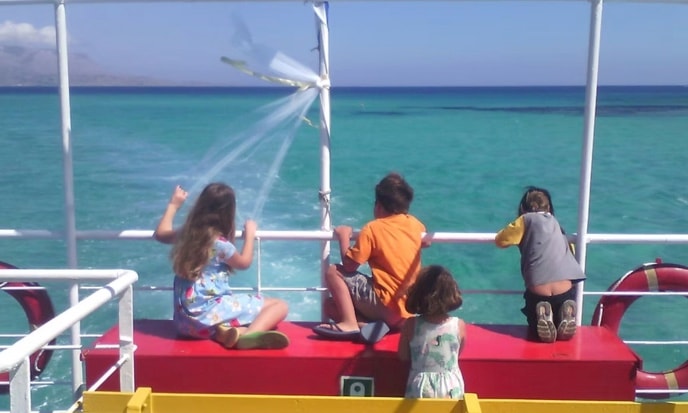
What They Offer
Porto Grana Worldschoolers Hub is a community space for worldschooling and homeschooling families in Laconia, Southern Peloponnese, Greece. They offer free WiFi, library, basic gym equipment, musical instruments, audiovisual lab, mini cinema and free bicycle rentals.
Curriculum
They nurture children’s natural curiosity through self directed learning. No classes, just resources for families to follow their own educational path while connecting with other worldschoolers in a supportive environment.
Cost
Annual membership is just €30 (around $32) for the year and access to all facilities and events. One of the cheapest worldschooling resources in Europe.
What’s Special?
What’s special about this hub is that it’s exclusively for worldschooling and homeschooling/unschooling families on the road. The founders no longer live in the area permanently but they have a 2 bedroom apartment as a guest house for visitors. The combination of educational and recreational resources, affordable membership model and opportunities to connect with other traveling families makes it a great resource for worldschoolers exploring Greece.
Website: https://portograna.wixsite.com/worldschoolers-hub
7. Portugal Pop Up Worldschool Hub (Portugal)
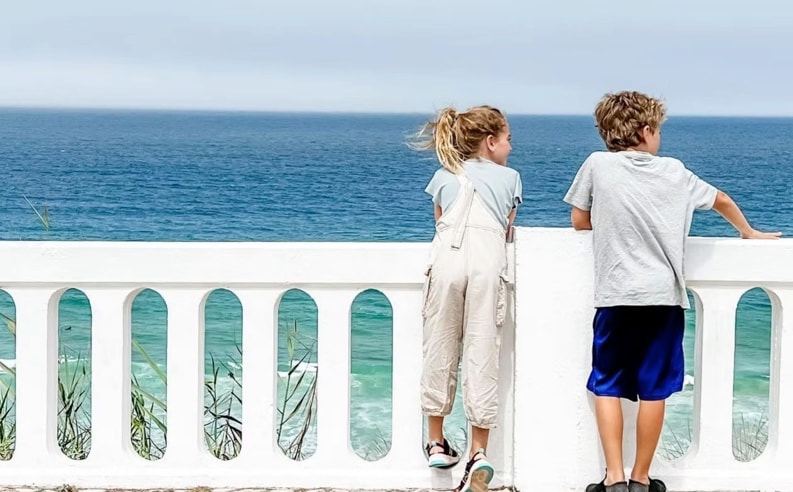
What They Offer
Portugal Pop Up offers weekly activities and meetups for traveling families exploring Portugal during Summer 2025. Their program includes beach meetups, park days, outdoor adventures, and cultural excursions designed to help families experience Portugal like locals. The flexible format allows families to join activities that interest them without pressure to participate in everything.
Curriculum
Their approach focuses on experiential learning through direct engagement with Portuguese culture and nature. Rather than formal lessons, children learn through exploration, social connection, and cultural immersion. Activities are handpicked to be both fun and educational, tested by the host family’s own children.
Cost
While specific pricing isn’t detailed in the search results, they emphasize making the experience accessible and providing value through local expertise and carefully selected activities.
What’s Special?
What makes this hub unique is its local expert hosts who share “hidden gems and authentic local culture that will ensure you experience the real Portugal.” The program is run by a family who has made Portugal their home base while worldschooling their own children, bringing personal experience to their hosting role. Their philosophy emphasizes freedom and flexibility, allowing families to participate in whatever works best for their travel style.
Website: https://www.portugalpopup.com/
8. Hub Amsterdam Netherlands (Netherlands)

What They Offer
Running from September 18 to October 6, 2025, this Amsterdam-based hub provides worldschooling activities in one of Europe’s most culturally rich and accessible cities. The program brings together traveling families to explore Amsterdam’s unique blend of historical significance and progressive modern culture.
Curriculum
While not specifically detailed in the search results, Amsterdam’s rich museums, canal system, bicycle culture, and artistic heritage provide natural opportunities for experiential learning across subjects including art, history, urban planning, and sustainable transportation.
Cost
Specific pricing isn’t mentioned in the search results, but interested families can sign up for their mailing list to be notified when bookings open.
What’s Special?
Amsterdam’s unique position as a walkable, bike-friendly city with world-class museums makes it an ideal setting for worldschooling. The city’s progressive approach to urban planning, environmental sustainability, and social policies offers families opportunities to explore alternative ways of organizing society while enjoying its picturesque canal system and cultural attractions.
Website: https://www.naturallyricher.com/homeschooling
9. The Field School of Hvar (Croatia)
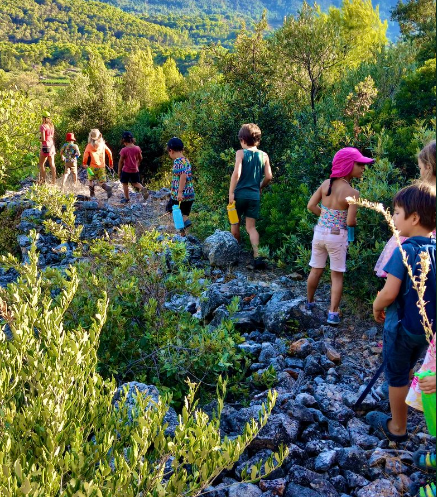
What They Offer
The Field School of Hvar is a new independent school opening in September 2026 on the island of Hvar, Croatia. This fully accredited school is looking for entrepreneurial, community-oriented founding families who want an innovative educational environment based on experiential learning, climate action and beauty. Not open yet, it will serve children from infants to 15 years old with a 12 month academic calendar designed for family flexibility.
Curriculum
Academic excellence through hands on learning and real world accountability. Learning by doing is core, connecting classroom concepts to tangible projects and community involvement. No curriculum details yet, but will be fully college and career preparatory with English as the language of instruction.
Cost
Tuition not available yet, contact the school to find out about upcoming application deadlines and financial aid options.
What’s Special?
What’s unique about this school is its location on the island of Hvar, famous for its natural beauty and cultural heritage. The school’s commitment to climate action and sustainability means children will have the opportunity to work on environmental projects and develop a deep connection to nature. The founders want to build a community around family, knowledge and nature.
Website: Field School of Hvar
10. Mitananda H.O.F. (Austria)
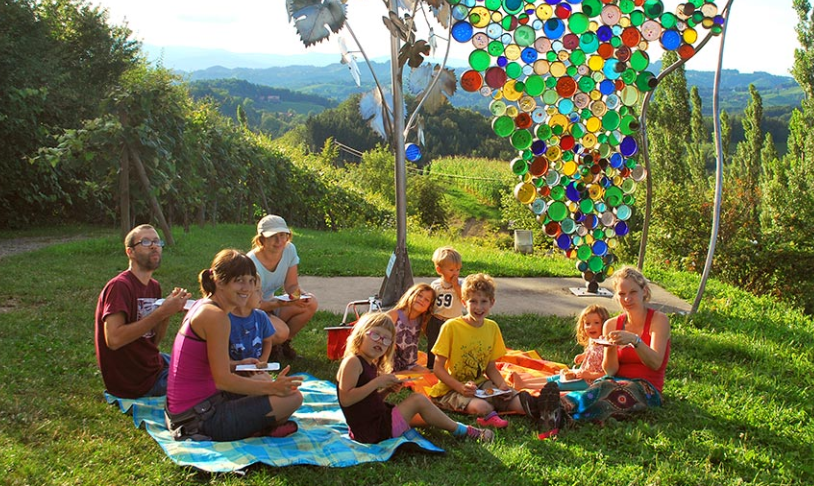
What They Offer
Mitananda H.O.F. is a regional and international gathering center nestled among picturesque vineyards in the Südsteiermark Nature Park in Austria. They offer space for seminars, workshops, celebrations, summer camps, language holidays, intensive courses, and extraordinary adventure vacations. Focused on self-directed sustainable living and unschooling, they also provide a creative workshop.
Curriculum
While not structured around formal academic subjects, the learning experience focuses on real-world skills and sustainable living practices. Children and families participate in workshops ranging from woodworking and metalworking to permaculture gardening and self-sufficiency skills. Their creative workshop also hosts artistic and inventive projects.
Cost
While specific costs are not listed, they offer several programs and events that cater to different interests and skill levels. For more accurate pricing, contact the H.O.F. directly.
What’s Special?
What makes this destination unique is its focus on self-directed, sustainable living practices. They also host a Freilernerzentrum (Unschooling Center), making it a valuable resource for families seeking alternative educational models. The combination of creative workshops, natural surroundings, and a community focus on sustainable living makes it an ideal setting for hands-on learning and cultural exchange.
Website: Website: Mitananda HOF
11. Worldschooling Andalusia (Spain)
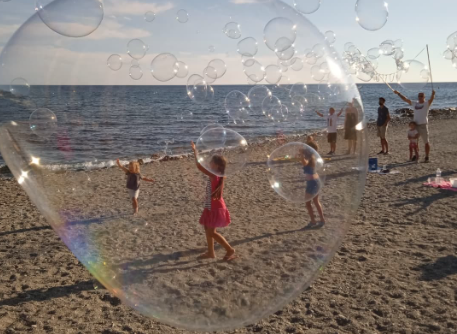
What They Offer
Worldschooling Andalusia is a community in La Herradura, Southern Spain. A non-profit initiative that brings together traveling families, digital nomads and local residents to create an educational experience that combines cultural exploration with everyday life. The community offers workshops, classes, cultural adventures and regular meetups across the Andalusia region.
Curriculum
No structured curriculum here! Instead, cultural immersion through real life experiences. Members can lead classes or organize activities that turn everyday Spanish experiences into learning opportunities. Tapas nights, flamenco lessons and other local cultural practices.
Cost
Membership is super cheap at just €30 per year. That’s access to all community events and activities. Great value for families who want cultural immersion without the cost of formal schooling.
What’s Special
What makes this community unique is its democratic and hierarchy free structure. Members are encouraged to contribute by teaching classes, leading adventures or organizing activities. Focus on real cultural experiences instead of traditional classroom instruction makes this community a breath of fresh air from conventional education.
Facebook: Worldschooling La Herradura Andalusia Spain
12. Worldschooling Bansko (Bulgaria)
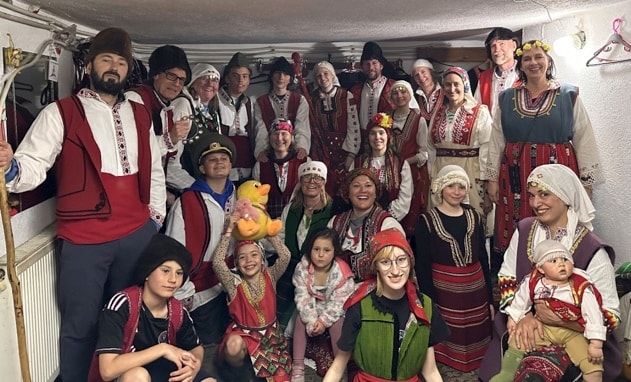
What They Offer
Worldschooling Bansko has been bringing families together in Bulgaria’s picturesque mountain town for five years now. And that’s where the real magic happens. Lifelong friendships and meaningful connections are forged here—each and every season. Every year, that initiative offers a unique blend of activities, housing options and opportunities to connect with like-minded families from all walks of life.
Curriculum
At the heart of Worldschooling Bansko are the connections—and the learning—that come from being part of a community. There’s no set curriculum here-you won’t find one. What you will find are families participating in group activities, cultural exchanges and outdoor adventures set amidst the stunning natural beauty of Bansko. That’s where the real learning happens—through the relationships you build, the collaborations you undertake and the experiences you share with fellow worldschoolers.
Six week session: 145 Euros per week and parents have a 50% discount.Housing starts from 125 Euros per week and the adventure pack add on is 35 Euros per week.
Cost
Six weeks cost 145 Euros per week. Parents get a 50% discount on that. Housing starts at 125 Euros per week. And if you want to add the adventure pack to your stay, that’s an extra 35 Euros per week.
What’s Special?
What sets Worldschooling Bansko apart is its focus on building a community that really feels like family. Surrounded by the breathtaking Pirin Mountains, families can get immersed in nature and in each other. You’ll find group activities that foster learning, growth and cultural exchange. Community values and mutual respect are at the heart of that experience—and that’s what makes Worldschooling Bansko so enriching for everyone involved.
That sense of community—and belonging—is what families come back to year after year. And it’s what makes the experience here so unique.
Website Link: https://arcticterns.global/worldschooling-bansko-2025/
13. Shepherd’s Rest (Spain)
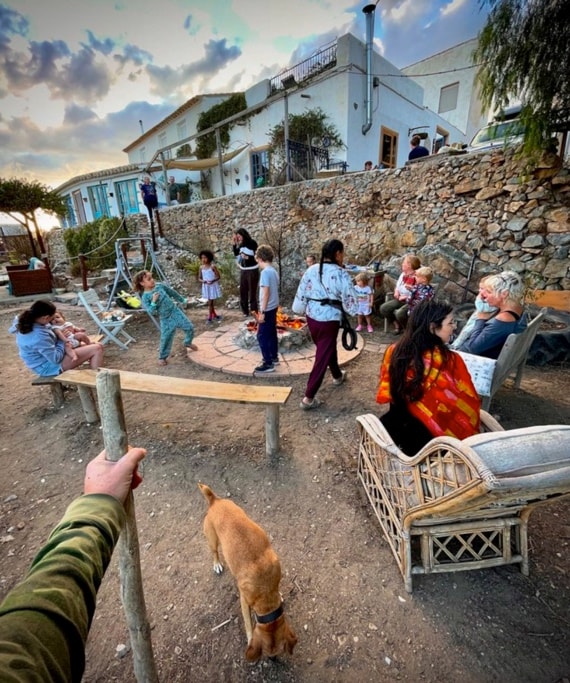
What They Offer
Shepherd’s Rest in Spain is a rural worldschooling community that really feels like home. Located in Oria, Andalucia, it offers families a chance to connect, learn and have some real adventures together. You’ll find two farmhouses with self-contained apartments and communal spaces that just beg for families to bond, explore nature and make memories together.
Curriculum
That connection and learning come from nature and culture. Kids can hike through pine forests, swim in lakes, garden and observe wildlife. And families share meals, art projects and cultural exchanges that show off Spain’s incredible traditions. There are toys, art supplies and outdoor play areas for kids to learn through play and creativity.
Cost
Prices are 995 Euros to 1245 Euros per month.
What’s Special?
What really sets Shepherd’s Rest apart is the way it creates those strong emotional connections between parents and kids-and between families from all around the world. You get reliable internet access to support remote work or online learning, so you can still have all the modern conveniences of city life. And the stunning natural surroundings of Andalucia offer endless opportunities for outdoor adventures and relaxation.
That’s what makes Shepherd’s Rest feel like a home away from home for worldschooling families.
Website: Shepherds Rest
Africa
Africa is the ultimate worldschooling playground where ancient traditions, wild animals and vibrant cultures come together to create life changing experiences. From the medinas of North Africa to the savannas of East Africa and the diverse ecosystems of sub-Saharan regions, the continent offers unbeatable opportunities for place based education that combines cultural immersion with nature exploration. African worldschooling hubs have emerged as communities where traveling families can connect with local wisdom keepers, participate in cultural exchanges and see conservation in action – experiences impossible to replicate through traditional education. The continent has 54 countries, thousands of languages, tribes and customs so Africa is the perfect place for kids to develop global citizenship, environmental awareness and cross cultural understanding through direct experience not just textbooks. Below we explore 6 worldschooling hubs in Africa that welcome traveling families looking for deep educational immersion in the continent’s landscapes and traditions.
1. Madrasa Dunya WorldSchool (Morocco)
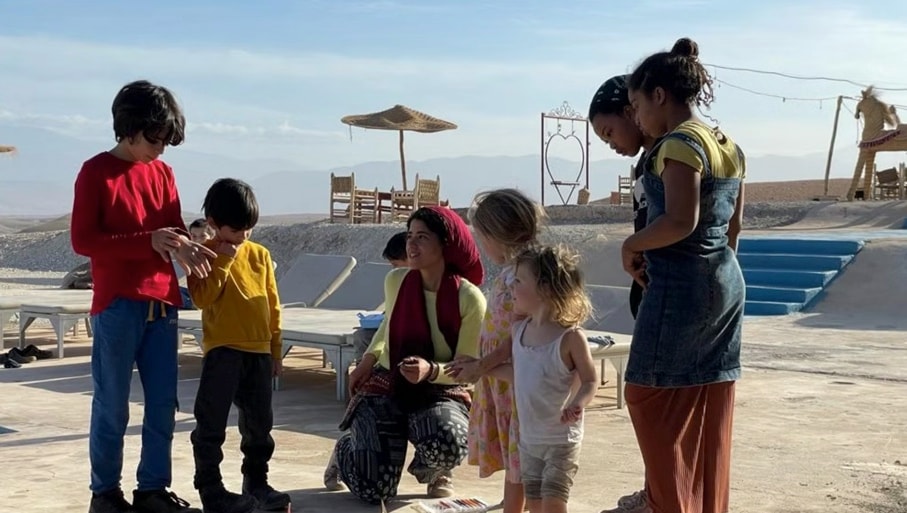
What They Offer
Located near Marrakech, Madrasa Dunya is a unique educational hub created by a mix of expat and local educators. The program serves worldschooling families, local people, and homeschooling residents from the Marrakech region. Their mission centers on being an educational community that feels like home, where participants learn from each other through cultural and wisdom exchange while developing real-life skills.
Curriculum
The curriculum emphasizes discovering, creating, exchanging, and connecting through authentic experiences. Learning happens through direct engagement with Moroccan culture, nature, stories, and people. Their educational philosophy focuses on preparing youth for life (Hayat) in this world (Dunya) through blending knowledge and experiences from Morocco’s rich cultural heritage.
Cost
Short-term hub fees are clearly structured with several options:
- 6-8 week stays: $210 per child per week
- Sibling discounts: $185 per week for two children, $160 per week for three or more
- 2-week hubs: $260 per week for one child, $235 for two children, $210 for three or more
- Long-term homeschool program: $600 per child annually (includes curriculum and materials)
- Monthly payment plans: $300 for one child, $500 for two, $600 for three
What’s Special?
Website: https://www.md-worldschoolmorocco.com/
What makes this hub unique is its location in the Amazigh village of Belhouane (“taste of fruits” in Amazigh) near Marrakech, providing easy access to the vibrant city, Agafay desert, and famous locations like Setti-Fatma and Oukaimden. The program is led by the Mechrout/Pedersen family, a Moroccan/multicultural family of seven who relocated from Rotterdam, Netherlands, creating a truly international educational environment while maintaining deep connections to local traditions.
2. Worldschooling Tanzania with Marissa Lipovsky (Tanzania)
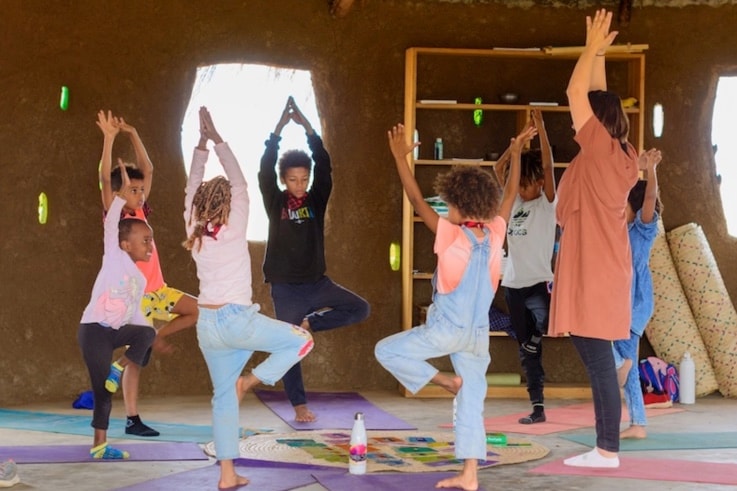
What They Offer
This 21-day coliving experience in Moshi, Kilimanjaro, Tanzania provides worldschooling families with a structured community experience at the foot of Africa’s highest mountain. The program creates opportunities for families to learn together while exploring Tanzania’s remarkable natural environments and cultural heritage through guided experiences and community connections.
Curriculum
While specific curriculum details aren’t provided in the search results, the program combines environmental education, cultural immersion, and community-based learning experiences. Located in the Kilimanjaro region, families have opportunities to learn about local Chagga culture, conservation efforts, and Tanzania’s unique ecosystems through direct experience rather than traditional classroom instruction.
Cost
Each session is 21 days in length and includes on-site accommodations. Registration is based on the number of family members, including parents:
- Family of 2: $2,900
- Family of 3: $3,200
- Family of 4: $3,500
- Family of 5: $3,800 (assuming one room is needed; additional charges apply for extra rooms)
This tiered pricing structure makes the program accessible for families of different sizes while including accommodations for the entire three-week experience.
What’s Special?
What makes this hub unique is its location in Moshi, at the base of Mount Kilimanjaro, providing families with access to one of Africa’s most iconic natural landmarks. The coliving format creates a supportive community environment where traveling families can connect while experiencing Tanzania’s cultural and natural wonders together. The program has received excellent reviews with a perfect 5.0 rating from participants, suggesting high satisfaction with the experience.
Website: https://worldschooly.com/hub/worldschooling-tanzania/
3. Mirleft Cultural Cove (Morocco)
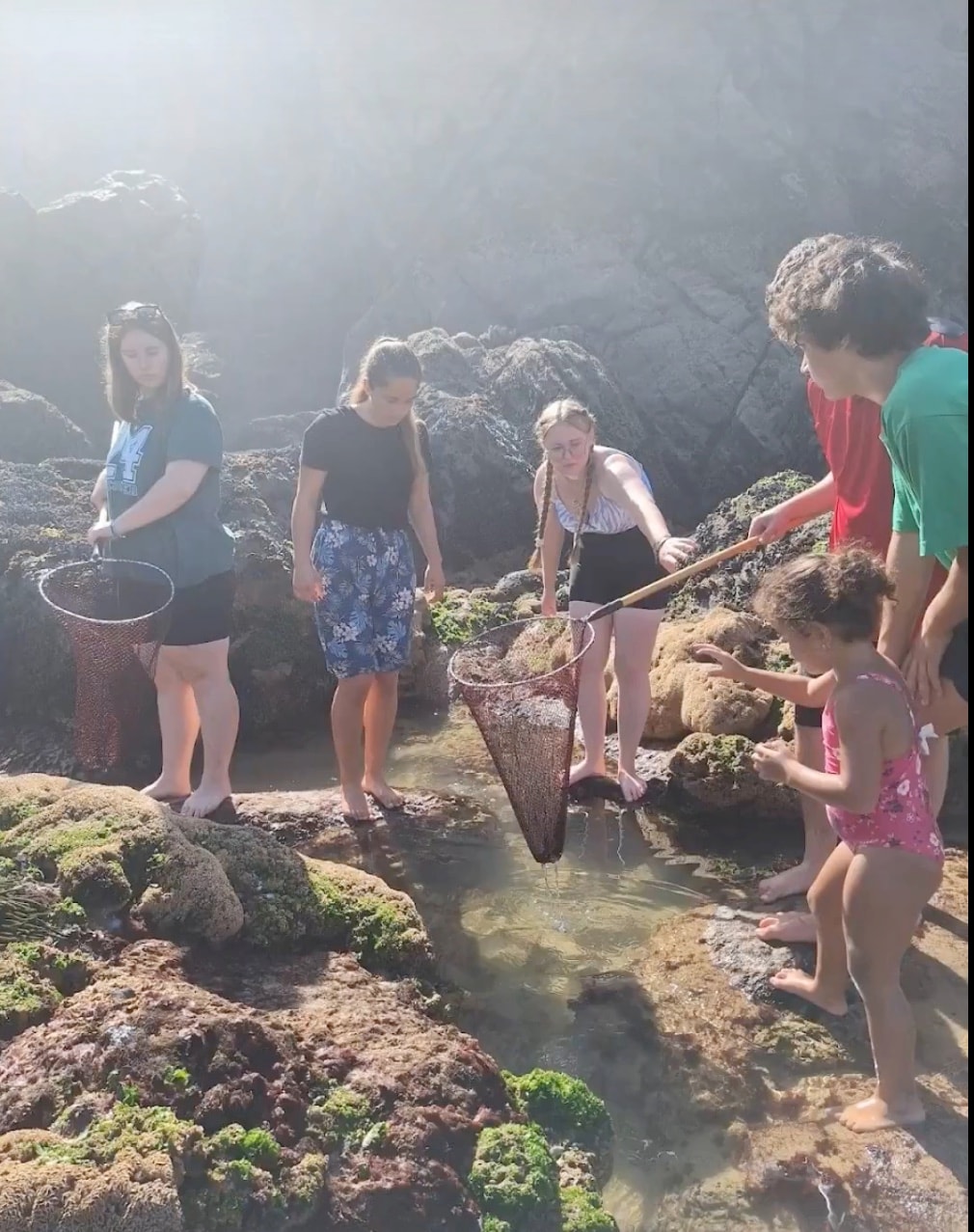
What They Offer
Mirleft Cultural Cove offers a 4 week worldschooling program for children 4-18 in the lovely coastal town of Mirleft, Morocco. Program runs Monday to Thursday 10am-3pm and Friday 10am-12pm. Self directed learning through cultural immersion. For traveling families looking for authentic Moroccan experience and structured activities for children.
Curriculum
Hands on activities, local exploration and community engagement. Children will do Darija (Moroccan Arabic) language lessons, traditional crafts, cooking with local ingredients and outdoor adventures. Learning happens naturally through direct engagement with Moroccan culture not formal instruction. Balance of structured activities and free time.
Cost
The program costs $600 for the full 30-day session. A 40% deposit is required to hold your child’s space in the program, which is fully refundable up to 45 days before the start date. Cancellations made within 45 days of the start date will forfeit 40% of the deposit to cover administrative and material costs.
What’s Special?
Led by a passionate trio with diverse backgrounds: Aliyah Santos, worldschooling mom of 4 with Early Childhood Education expertise; and Hassnae Iguid, certified nurse with deep knowledge of Amazigh and Moroccan culture. Parents rave about the program’s authentic cultural experiences and the care given to the children. The coastal location offers beach activities alongside cultural exploration.
website: https://www.mirleftculturalcove.com/
4. Starseed Community School (South Africa)
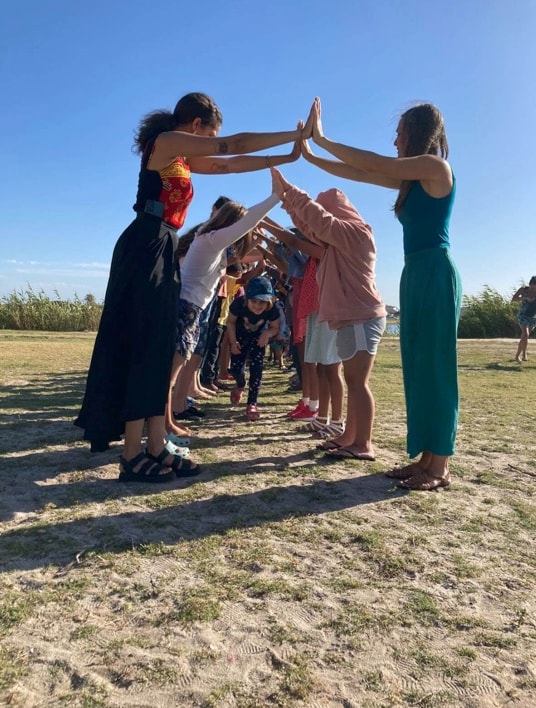
What They Offer
Starseed Community School (previously The New Muizenberg School) welcomes worldschooling families to their community-led education program in Muizenberg, Cape Town. While they serve as a full primary school for local students, they offer flexible enrollment options for traveling families to be immersed in South African culture and education.
Curriculum
The curriculum is Waldorf-based and takes into account the academic, physical, emotional and spiritual needs of each child. They draw on South Africa’s rich local cultures and traditions to help children develop love and respect for all people regardless of background. They use the Muizenberg Village’s resources – the library, beach, vlei, mountain and community gardens – as extensions of the classroom.
Cost
For worldschooling families, weekly attendance costs around R3,500 (about $250) per child. Monthly options are available at R12,000 (about $850) per child. These fees include all materials, activities and daily vegetable snacks. Accommodation is not included but the school can recommend family-friendly options in Muizenberg.
What’s Special?
What makes this school unique is its collaborative governance structure – there is no Principal or Head Teacher; decisions are made collectively through parent involvement. Every parent/guardian in the school community is required to volunteer in some way, so for worldschooling families, this is an opportunity to experience South Africa’s Rainbow Nation philosophy in action while being part of a progressive educational model.
Website: https://starseedcommunityschool.org/
5. Nile River School (Egypt)
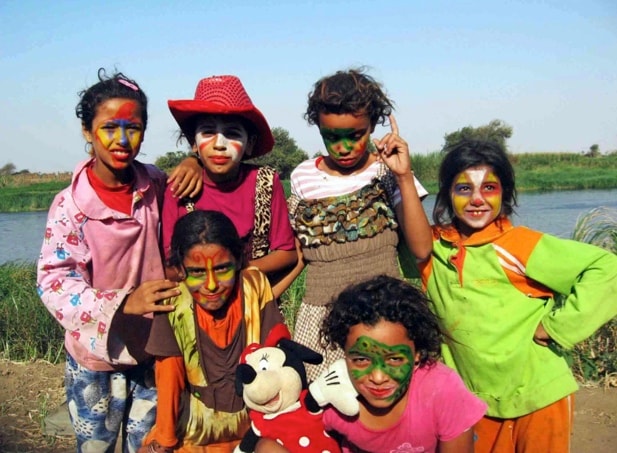
What They Offer
The Nile River School is a charity kindergarten and Children’s Centre in a small village near Al Ayat, Giza district, 100km South of Cairo on the banks of the Nile. While they primarily serve local children, they welcome worldschooling families as volunteers and participants in their programs and offer the opportunity to live and work in rural Egypt while making a meaningful contribution to education.
Curriculum
The school applies Neohumanist Education principles of love and respect for all beings. Their approach is lifelong learning, practical application, environmental sustainability and healthy living. Activities include interactive learning through games, creative expression through various art forms, English language and cultural exchange. They have a vegetarian diet in line with their holistic wellness philosophy.
Cost
As a volunteer opportunity there are no program fees for participating families. However, volunteers contribute €50-100 per week to cover food and basic accommodation costs. Long term volunteers (1+ months) may get reduced rates. Volunteers arrange their own accommodation in Al Ayat, but some assistance with lodging arrangements may be available through the program.
What’s Special?
What makes this place special is the authentic rural Egyptian setting – a village without running water, high illiteracy rates and children with limited educational opportunities. For worldschooling families looking for cultural immersion beyond tourist experiences, the centre offers the chance to contribute while learning about Egyptian rural life. The area is safe with basic shops 10 minutes bicycle ride away.
Website: https://gurukul.edu/participate/volunteers/nile-river-school-egypt/
6. Turtle Bay Beach Club (Kenya)
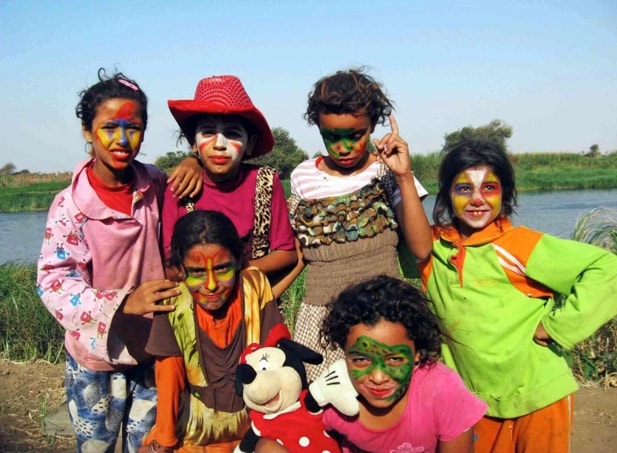
What They Offer
Turtle Bay Beach Club in Watamu, Kenya provides an immersive educational experience that combines resort amenities with responsible tourism and community involvement. Their program includes Kids Club activities led by knowledgeable staff who guide children through the surrounding Watamu Marine National Park ecosystem. Families stay at the resort while participating in educational activities focused on marine conservation, local culture, and environmental sustainability.
Curriculum
The curriculum emphasizes hands-on environmental education, with activities including kayaking expeditions in the marine park, recycling workshops, and ecological exploration. Children participate in what the resort calls “world-schooling and education as part of the fun,” learning about marine ecosystems through direct experience rather than textbooks.
Cost
Accommodation rates at Turtle Bay Beach Club range from $150-250 per night for families (all-inclusive), depending on season and room type. The Kids Club activities and educational programs are included in the resort stay, though some specialized excursions may incur additional fees. The resort offers special packages for families staying a week or longer.
What’s Special?
What makes this program unique is its setting within a marine national park, offering opportunities for children to explore coastal ecosystems while learning about conservation efforts. The resort’s commitment to responsible tourism creates authentic learning experiences beyond typical tourist activities. Families consistently praise the “knowledgeable Kids Club staff” who make learning engaging and fun for children of various ages.
Website: https://www.tbbckenya.com/kids-club
North America
North America is a worldschooling wonderland that offers incredible diversity—from wilderness classrooms to urban innovation labs—all within one continent. With well-established homeschooling laws, families enjoy more educational freedom and fewer regulatory challenges than in many other parts of the world.
From Canada’s magnificent natural settings to America’s flourishing alternative education communities, families can easily travel between dramatically different learning environments without international flights. Your children might explore lush forests on Monday and discover desert wonders by Friday—all within a single road trip.
Looking to connect? We’ve gathered five exceptional worldschooling communities where your family can build meaningful relationships while creating unforgettable learning experiences that your children will treasure forever.
1. Manitoulin Worldschooling Community (Canada)
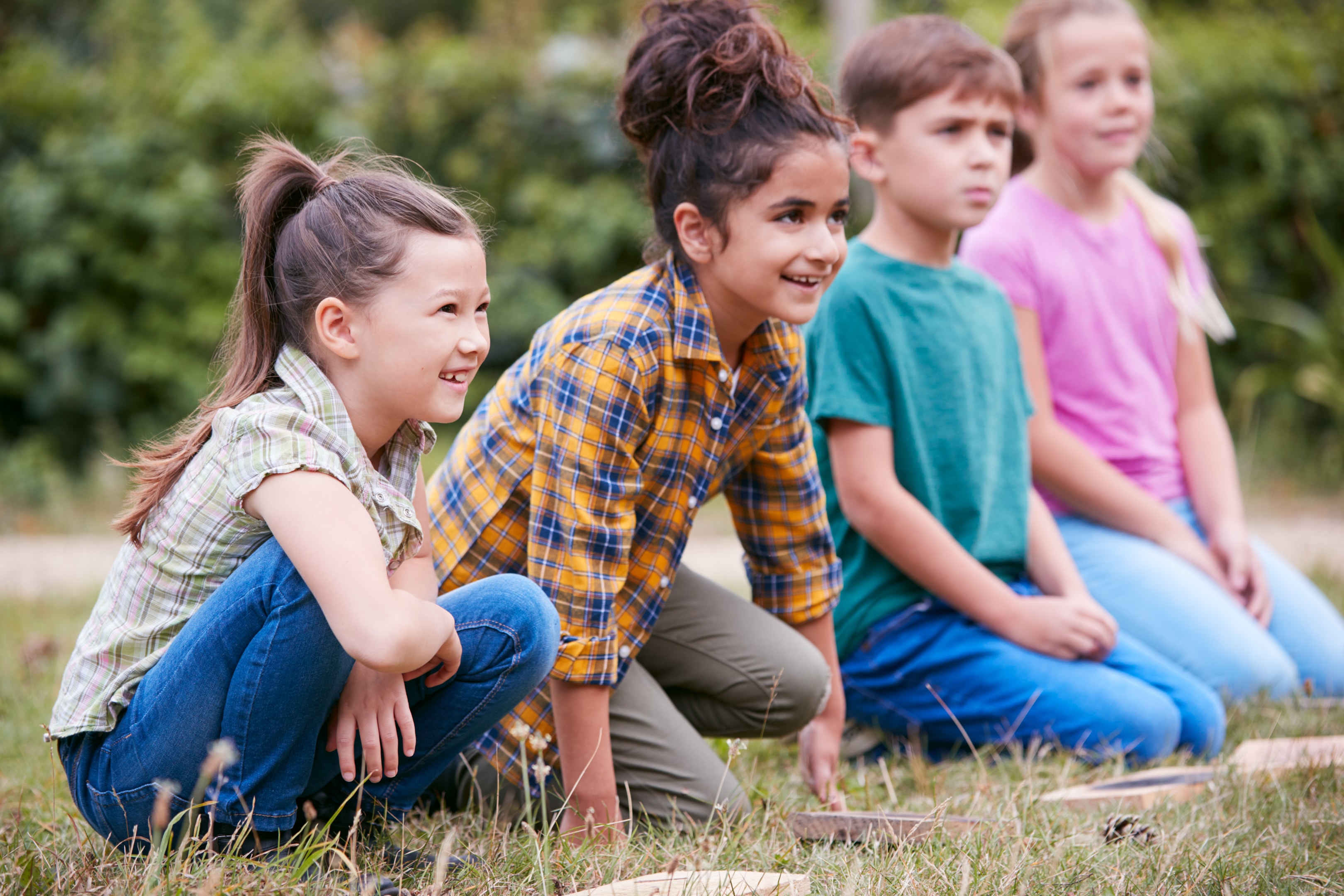
What They Offer
Manitoulin Worldschooling Community, near Toronto, Canada, offers a nature-based worldschooling experience during the warmer months (May to October). They welcome traveling families and volunteers and provide an immersive living environment where children learn through direct engagement with nature and community life. Their approach focuses on outdoor education and environmental stewardship while creating social connections for traveling children.
Curriculum
Curriculum is unschooling friendly, harmony with nature and earth stewardship. Children learn through community activities, outdoor exploration and a wide variety of recreational activities such as kayaking, hiking and environmental projects. Learning happens organically through direct experience not structured lessons.
Cost
$400 per month which includes accommodation (tents or trailers) and communal dinners. Sliding scale for volunteers who contribute to the community through work projects or sharing skills with other participants.
What’s Special
What sets them apart is their stable group of regular participants who have been returning for over 6 years, creating continuity while welcoming new families. Emphasis on environmental education in a natural setting allows children to develop deep connections to the natural world. Their integrated approach to learning, living and recreation creates a holistic educational experience for traveling families.
Email them: ManitoulinWorldschooling@gmail.com
2. The Human Hive (Dominican Republic)
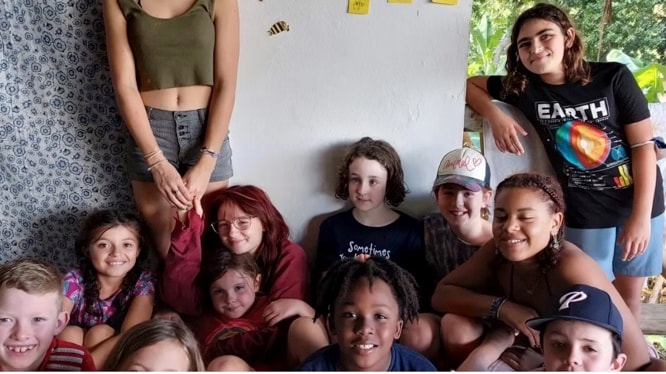
What They Offer
The Human Hive is a global initiative that empowers individuals and groups to become ChangeMakers. By connecting, collaborating and taking practical action, they address real-world challenges together. At the heart of their programs are education, activism and wellbeing—building a sustainable future for people, place and planet.
Curriculum
Their family-friendly Hive Adventures, online courses for ChangeMakers and a podcast all aim to inspire and equip participants with the tools they need to make a difference. That happens through experiential learning and activism—hands-on activities like artivism (activism through the arts), wellbeing workshops and collaborative problem-solving.
Cost
You can participate in those activities in the Dominican Republic or remotely. The cost varies per program. For the six-week Changemaker Adventure in the Dominican Republic, that’s $1995 all included (daily activities run from 8:30am to 2:30pm, Monday to Friday). Bursaries are available.
What’s Special?
What sets The Human Hive apart is its collaborative approach. They work with communities—not impose solutions. That means their programs focus on belonging, safety and purpose. And by doing so, they foster a global network of ChangeMakers who are committed to positive action. Wellbeing is just as important as changemaking. Participants develop the resilience they need to make a real impact through that focus.
Website : The Human Hive
3. Camp Stomping Ground (New York)
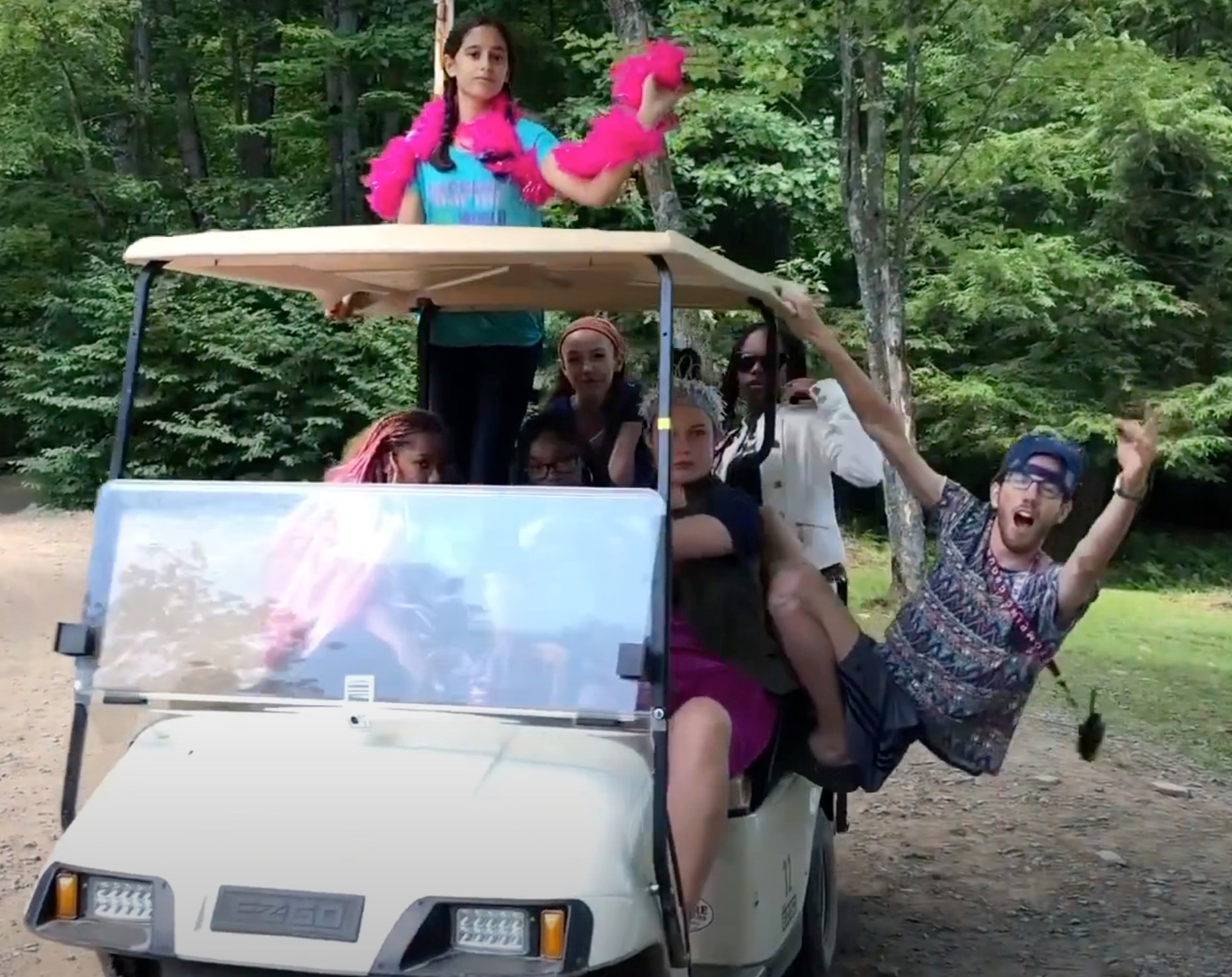
What They Offer
Camp Stomping Ground offers summer education programs in the Catskill Mountains of New York state. While primarily structured as a summer camp, their approach aligns with worldschooling values by creating an immersive community where children develop social and emotional skills through direct experience. The camp provides both residential and day program options for children seeking alternative educational experiences.
Curriculum
The curriculum focuses on non-violent communication, emotional intelligence, identification of needs, and conflict resolution. These “soft skills” form the foundation for all other learning, creating a community where children feel empowered to direct their own learning experiences. Activities include outdoor adventure, creative arts, and community building.
Cost
Weekly residential programs cost $1,350 per child with multi-week discounts available. Day program options are available for $850 per week. Scholarship options are available for families demonstrating financial need, making the program accessible to diverse socioeconomic backgrounds.
What’s Special?
What distinguishes this program is its focus on emotional intelligence and conflict resolution skills that transfer to all learning contexts. The camp creates a microcosm where children practice the social skills essential for worldschoolers who regularly navigate new communities and cultures. The Catskill Mountain setting provides a beautiful natural environment for outdoor learning experiences.
Website: https://campstompingground.org/summer-camp
4. Deliberate Detour (Oaxaca, Mexico)
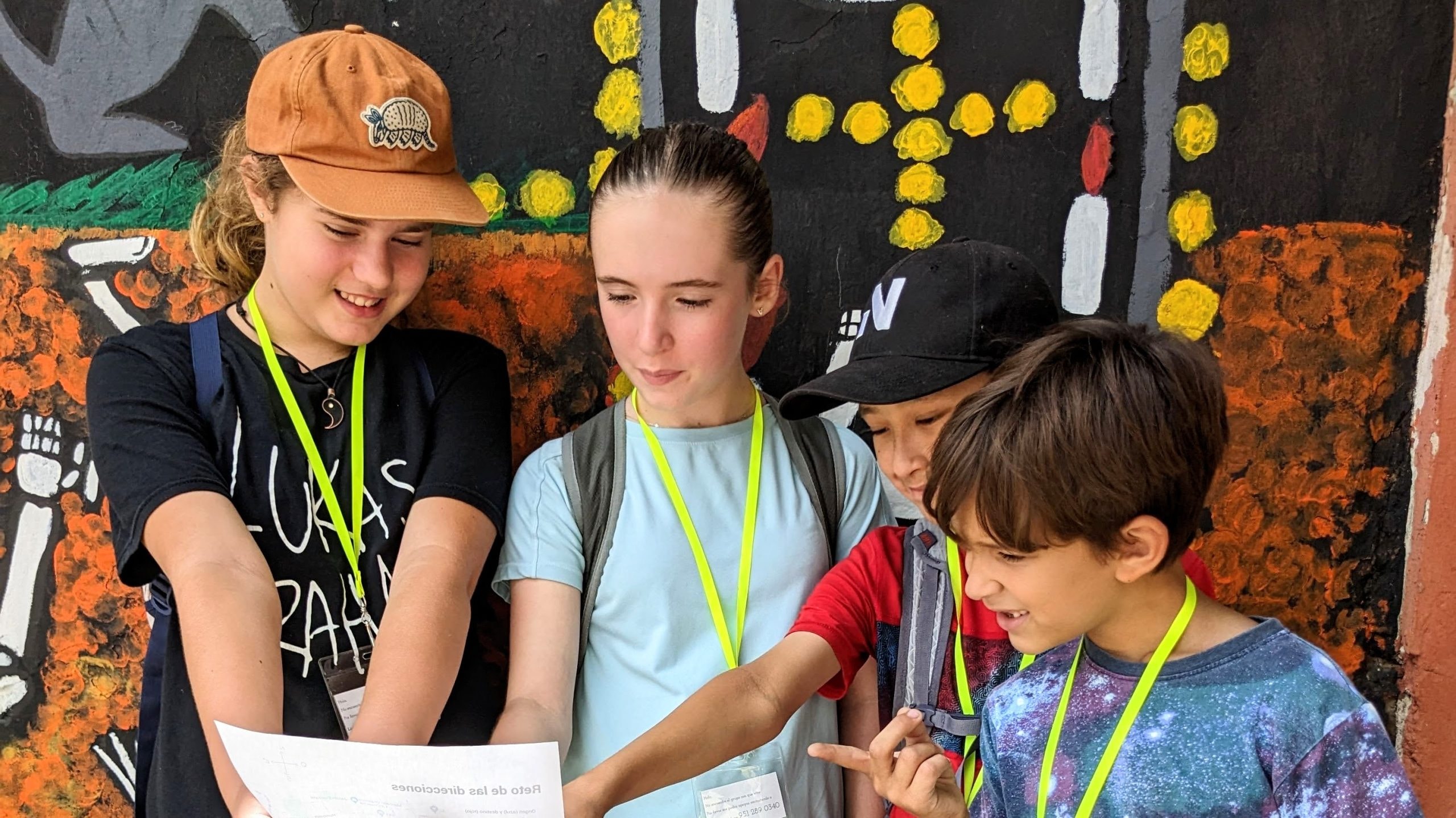
What They Offer
While in North America, we’re including this one because it’s a South American-adjacent option. Deliberate Detour’s Oaxaca program is an amazing cultural immersion for kids 7-16. Families get 4 structured days a week with all transportation, vegetarian lunches, snacks and activity materials included.
Curriculum
What makes this program stand out is how it centers around exploring Oaxaca’s incredible cultural heritage through hands-on workshops, neighborhood walks and visits to historical sites. Kids don’t just learn about Mayan and Zapotec traditions – they experience them, from making chocolate the traditional way to exploring ancient ruins with knowledgeable guides.
Prices
The price is the same as their Peru hub: $795 per person for 2 week sessions or $1,205 per person for 3 week options. Optional add-ons many families find worth it are the Friday field trips ($85-$110), parent-only activities ($55-$105) and language lessons. 2025 dates are May 25-June 6, June 8-20, June 22-July 4, October 12-24 and November 9-21.
What’s Special
What families love most about this hub is the Oaxaca region, the hands-on workshops with local artisans and the bilingual staff. Small group sizes mean personalized attention and testimonials say it’s life-changing for kids and parents.
Website: Link: https://deliberatedetour.com
5. Anahata Worldschooling Community (Yucatan Peninsula, Mexico)
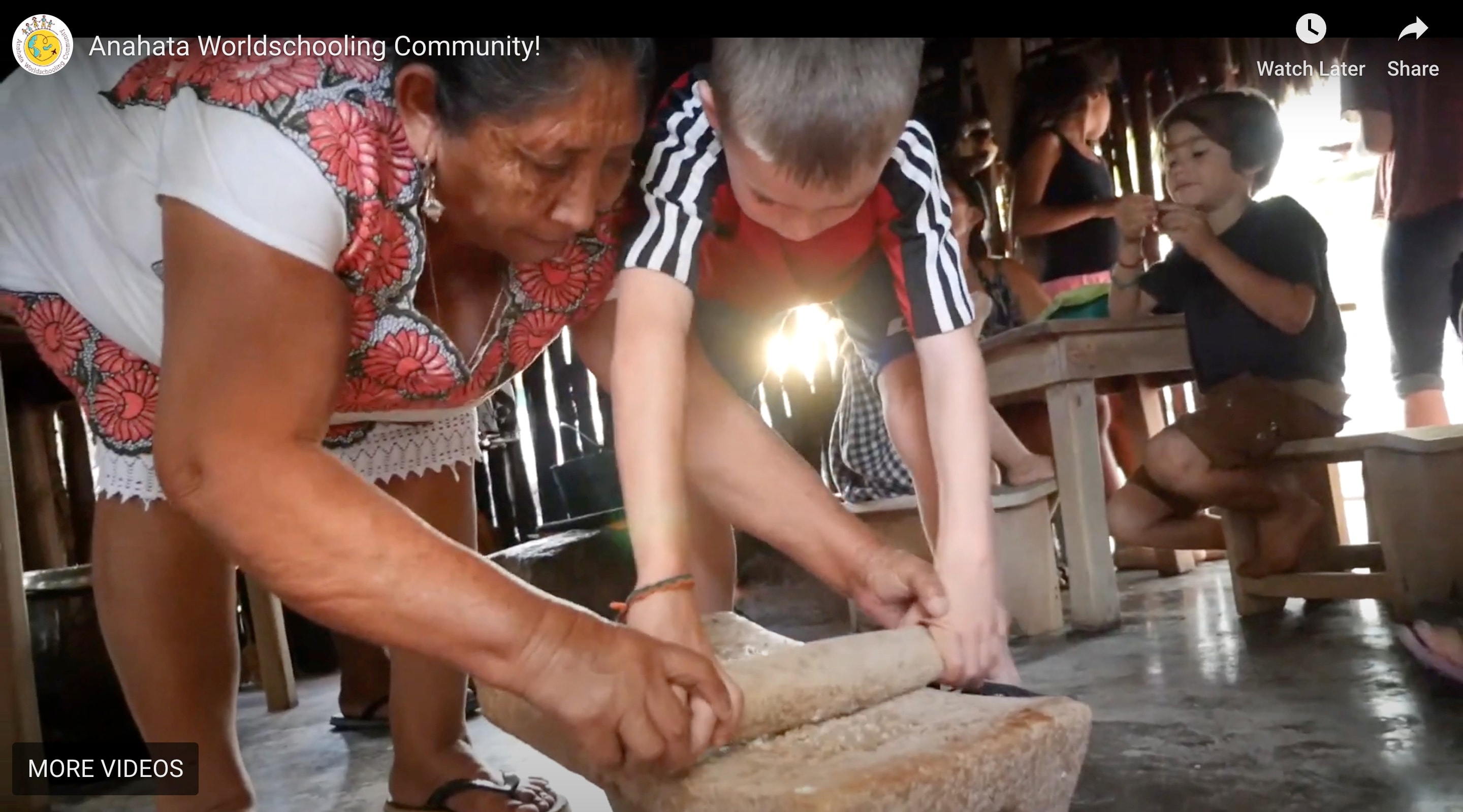
What They Offer
Anahata is a co-living community for worldschooling families in the Yucatan Peninsula, Mexico. We welcome families from all over the world into our community-centered home for traveling families. We believe in building lives of fulfillment through community, learning, health, culture and adventure.
Curriculum
Their educational philosophy is freedom-based learning where children pursue their interests with guidance from peers and elders to deepen their understanding. Yoga, meditation, cultural immersion and holistic health practices are integrated with traditional academic subjects. The schedule is co-created each program according to what families want to offer, so it’s flexible and personalized.
Cost
They don’t have pricing on their website, but offer accommodation options for families staying at our facility. Contact them for current rates and availability.
What’s Special?
What sets them apart is their focus on creating deep, meaningful experiences through community living. Their values of community, learning, depth and fulfillment create a space where worldschooling families can experience real cultural immersion in the Yucatan region and stay connected with like-minded travelers. Testimonials rave about the sense of community, personal growth and magical experiences families have had here. They are inspired by the heart chakra, Anahata and organized by Patty Rojas who was inspired to create this community after attending the Stone Soup worldschooling gathering.
Website: https://anahataworldschoolingcommunity.com/
We’ve covered all this in this guide—worldschooling hubs around the world are changing education for adventurous families. From the beaches of Bali to the streets of Europe, from the savannas of Africa to the culture of South America, these innovative communities are proving the world is the best classroom.
Worldschooling is an educational movement that recognizes that a student can receive no greater education than by interacting with the world around them. By immersing your children in different cultures and languages, you’re giving them experiences that traditional schooling cannot provide, igniting a lifelong love of learning.
Whether you’re drawn to eco-focused programs of Costa Rica, tech-savvy hubs of Asia, or the historical richness of European worldschooling communities, there’s a fit for every family’s educational goals. As more families join this growing trend of world schooling, it’s becoming more accessible with options to suit every budget. The ability to afford world schooling comes down to carefully budgeting for food, housing, and utilities while traveling abroad. Many families begin saving a designated amount and reduce expenses to the minimum by utilizing free resources.
So are you ready to turn the world into your family’s classroom? The world is calling—it’s time to step outside your comfort zone and make every moment a teachable one. Your children’s education will be enhanced through culture and language immersion that no textbook can match. Your family’s greatest adventure in learning starts now!
Worldschooling Q&A: Everything You’ve Been Dying to Ask!
1. What is worldschooling?
Worldschooling is an educational approach that takes the saying “the world is a classroom” quite literally! It’s essentially a nomadic style of homeschooling where families travel for extended periods while their children learn through real-world experiences. Instead of textbooks and classrooms, worldschoolers use museums, historical sites, nature, and cultural immersion as their primary educational tools. It’s a unique approach to education that recognizes that a student can receive incredible learning experiences by actually interacting with the world around them!
2. How do I start worldschooling my children?
Oh boy, the million-dollar question! Starting worldschooling doesn’t have to be as intimidating as it sounds. First, do your homework (pun totally intended!) by researching resources on homeschooling styles and legal requirements in your home country. Many families can get started by:
- Joining online worldschooling communities (Facebook has several amazing groups!)
- Starting with short trips before committing to longer adventures
- Creating a flexible learning plan that incorporates your travel goals
- Checking out a good “welcome to homeschooling guide” to understand the basics
- Gradually transitioning from traditional school to a more travel-focused approach
I absolutely loved our “training wheels” phase where we took weekend trips while still maintaining a home base. It gave us confidence before we jumped into our extended travels!
3. Is worldschooling legal?
The short answer: Yes, but with some homework required! Worldschooling falls under homeschooling laws, which vary dramatically by country and state. Before you sell all your possessions and hit the road, you’ll need to:
- Research homeschooling requirements in your home country/state
- Understand how homeschooling while traveling abroad impacts your legal status
- Keep documentation of your children’s education
- In some places, you may need to register as homeschoolers or submit periodic assessments
Remember, each worldschooling family is unique in how they navigate these requirements. Some families maintain a legal residence in a homeschool-friendly location, while others work with umbrella schools that handle the bureaucratic side.
4. How do worldschooling families afford to travel?
Contrary to popular belief, you don’t need to be independently wealthy to worldschool! The trick is learning how to afford worldschooling through creative financial planning:
- Many families work remotely (hello, digital nomad life!)
- Others save intensively for a sabbatical-style adventure
- Some choose destinations where the cost of living is significantly lower than home
- House-sitting, home exchanges, and slow travel can dramatically reduce expenses
- Focus on budgeting for food, housing, and utilities just like you would at home
Remember that traveling doesn’t always mean expensive hotels and daily attractions. Many worldschooling families live quite modestly but prioritize experiences over possessions!
5. Will my children fall behind academically if we worldschool?
As a recovering perfectionist mom, I totally get this worry! But here’s the reassuring truth: most worldschooling families discover that their children thrive academically because learning becomes meaningful and contextual.
Many families incorporate a formal educational component to ensure core subjects are covered. Some focus heavily on subjects like math and reading while letting history, science, and social studies happen naturally through travel experiences (e.g., travel reviews writing as language arts practice!).
If you wish to introduce children to a balanced education, there are many curriculum options that complement a varied schedule of exploring and adventure.
6. How do worldschooling children make friends?
I’ll never forget my daughter’s tearful “But I’ll miss my friends!” moment when we first discussed traveling. The socialization question is totally valid! Worldschooling families find friends through:
- Connecting with other traveling families (there are worldschooling hubs in places like Bali, Mexico, and Portugal)
- Using social media groups to find meet-ups
- Joining local classes or activities wherever they stay
- Participating in worldschooling conferences and gatherings
- Maintaining online friendships with kids back home
- Engaging with local children through sports, parks, and community events
The socialization might look different, but many kids develop incredible social skills by learning to connect with people of all ages and backgrounds!
7. Can you worldschool part-time or do you have to travel full-time?
Great news! Worldschooling isn’t an all-or-nothing proposition. Many families take this adage quite literally in ways that fit their unique circumstances:
- Weekend adventures and field trips from a home base
- Summer worldschooling during school breaks
- Alternating periods of travel with periods at home
- Focusing on regional exploration rather than international travel
- Starting with a gap year approach before committing to longer-term travel
Our family started with “worldschooling weekends” before building up to longer trips. Those beach days and museum visits were just as educational as our later international adventures!
8. What are the pros and cons of worldschooling?
Let’s keep it real about this lifestyle choice:
Pros:
- Provides flexibility in exploring children’s talents that traditional schooling cannot provide
- Creates global citizens with cultural awareness
- Builds incredible family bonds through shared experiences
- Develops independence, adaptability, and problem-solving skills
- Offers a holistic approach to learning that connects subjects naturally
Cons:
- Requires significant financial and personal commitment
- Can be logistically challenging (visas, insurance, internet access)
- May create challenges for college applications (though many worldschoolers successfully attend university!)
- Potential for burnout if you don’t pace yourselves
- Sometimes missing extended family and long-term friendships
9. How do worldschooling families handle socialization and extracurricular activities?
Contrary to the “but what about soccer practice?!” concerns, worldschooling actually opens up amazing extracurricular opportunities:
- Taking local dance, art, or music classes wherever you travel
- Joining temporary sports programs or finding coaching in different locations
- Using travel itself as an extracurricular (hiking, swimming, navigation)
- Connecting with local homeschooling or worldschooling groups for joint activities
- Finding incredible mentors along the way in various fields
One worldschooling mom I know jokes that her biggest problem isn’t finding activities – it’s choosing which amazing opportunities to pursue since there are so many!
Remember, every worldschooling family is unique in how they balance academic learning with socialization and fun. The beauty is creating a lifestyle that enhances your children’s education in ways that work specifically for YOUR family!
